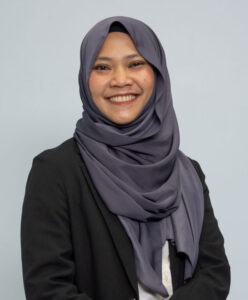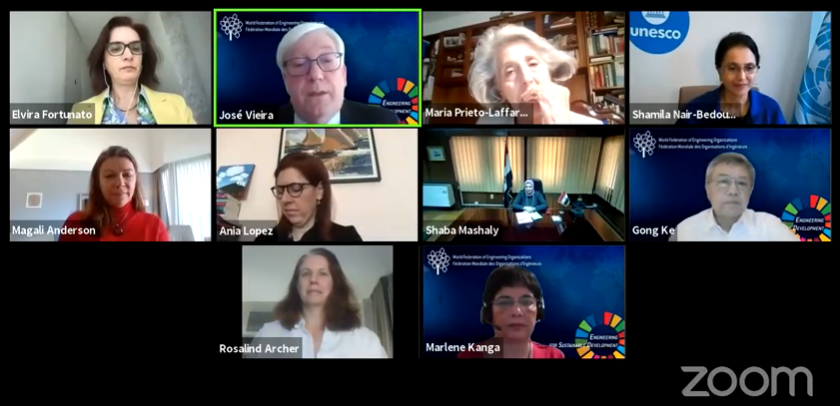- 2024 Awards
-
Announcement of the 2024 WFEO GREE Women in Engineering Award Laureates

The World Federation of Engineering Organizations (WFEO) and Gree Electric Appliances Announce the Winner of the 2024 WFEO GREE Women in Engineering Award
The World Federation of Engineering Organizations (WFEO), in partnership with Gree Electric Appliances, is thrilled to announce Prof. Syuhaida Binti Ismail of Malaysia as the recipient of the prestigious 2024 WFEO GREE Women in Engineering Award. This award recognizes women engineers across the world who have demonstrated outstanding achievements in engineering practice, academia, or leadership in business, underscoring the critical importance of women’s inclusion in STEM and inspiring young women and girls to consider careers in engineering.
The 2024 WFEO GREE Women in Engineering Award received a diverse pool of 24 nominations from 15 countries, reflecting the diverse global commitment to advancing gender equity in engineering. Nominees hailed from Brazil, Cuba, Costa Rica, Oman, Australia, China, the Czech Republic, Ghana, Lebanon, Malaysia, Singapore, the UK, and Zambia. The Awards committee, an independent panel of five engineers from five different countries along with a representative from Gree Electric Appliances, assessed the nominations which was then endorsed by the WFEO Executive Board and approved the award’s outcome.
2024 WFEO GREE Women in Engineering Award Laureate
Prof. Syuhaida Binti Ismail, nominated by the Institute of Engineers Malaysia, has been selected as this year’s laureate.
Prof. Ismail is an Associate Professor at the University of Technology Malaysia in Kuala Lumpur and the Director of Research at the Maritime Institute of Malaysia.
Her remarkable contributions to engineering education and research make her a deserving recipient of this honor.
WFEO extends its heartfelt congratulations to Prof. Ismail on behalf of its national, regional, international, and associate member institutions.Special Recognitions
In addition to the main award, two exceptional candidates have been awarded special recognition certificates as first and second runners-up:
Ms. Sylvia Yammine from Lebanon , CEO of SY Architects

Ms. Dolores de la Conception Lahaba Estrada from Cuba
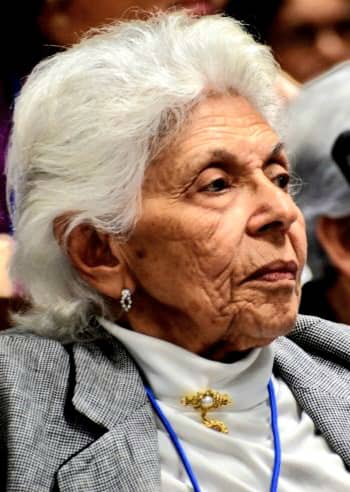
Prof. Ismail, along with Ms. Yammine and Ms. Lahaba Estrada’s work will be showcased and celebrated at the UNESCO World Engineering Day 2025 celebration, providing an inspiring platform to showcase women’s impact in engineering worldwide.
Learn more about the 2024 WFEO GREE Women in Engineering Award recipients:
Ms. Dolores de la Conception Lahaba Estrada
Press release of the announcement of the 2024 WFEO GREE Women in Engineering Award laureates
- 2023 Awards
-
Announcement of the 2023 WFEO Awards Laureates
On 13 October 2023 meeting in Prague, WFEO’s Executive Council approved the Laureates for the following WFEO awards, based on the recommendation from the Awards Committee.
The 2023 WFEO GREE Women in Engineering Award
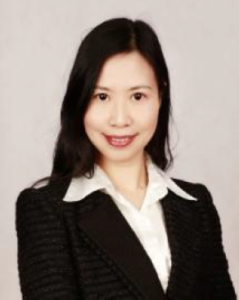 The WFEO Gree Women in Engineering Prize was attributed to Prof. Yandan Lin, professor at the School of Information, Science and Technology of Fudan University.
The WFEO Gree Women in Engineering Prize was attributed to Prof. Yandan Lin, professor at the School of Information, Science and Technology of Fudan University.Yandan Lin received B.S. and Ph.D. degrees in the Department of Light Sources & Illuminating Engineering, Fudan University in 1999 and 2005, respectively. She also received PhD education in Technical University of Darmstadt in Germany, based on the DAAD Joint PhD Program. She is now a full professor at the School of Information Science and Technology, Fudan University.
Her research interests include visual comfort, color vision, and human-centric lighting. She has been awarded more than 30 funding projects, including the National Natural Science Foundation of China, and the Special Projects for China Commercial Aircraft and Railway Vehicles. She is the Chair of CIE TC 1-91 (Color Quality of White Light) , Chinese representative for CIE Div4, Chairman of the Intelligent Transportation Lighting Committee of China Illuminating Engineering Society,member of SAC/TC114 and SAC/TC224, Chairman of The China International Automotive Lighting Forum(IFAL), and is active in the field of color vision and lighting.
For more information:The 2023 Hassib J. Sabbagh Award for Engineering Construction Excellence
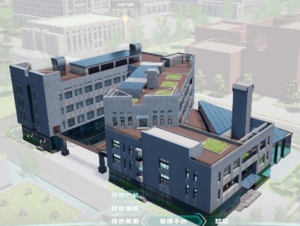 The WFEO CCC H.J. Sabbagh Prize for Excellence in Engineering Construction was attributed to the project “Demonstration Building with Solar Photovoltaic-Electricity-Thermal Sequential Conversion (Building No. 7 of the iHarbour campus), Xi’an Jiatong University, China” nominated by the China Association for Science and Technology.
The WFEO CCC H.J. Sabbagh Prize for Excellence in Engineering Construction was attributed to the project “Demonstration Building with Solar Photovoltaic-Electricity-Thermal Sequential Conversion (Building No. 7 of the iHarbour campus), Xi’an Jiatong University, China” nominated by the China Association for Science and Technology.To achieve future-oriented experimental research and talent training in the field of Zero-net carbon building design, the faculties and students from School of Human Settlements and Civil Engineering (HSCE), Xi’an Jiaotong University (XJTU), China jointly and independently designed the project of Building 7 of the iHarbour campus of XJTU. This project maximized the value of building performance through a variety of innovative designs.
For more information:Short presentation of the project
Detailed presentation of the project
The 2023 WFEO Medal for Excellence in Engineering Education
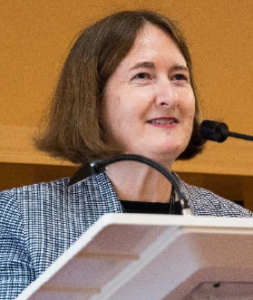 The WFEO Medal for Excellence in Engineering Education was attributed to Prof. Sally Male (Australia). Prof. Male is an engineering teacher at Melbourne University, and was nominated by Engineers Australia.
The WFEO Medal for Excellence in Engineering Education was attributed to Prof. Sally Male (Australia). Prof. Male is an engineering teacher at Melbourne University, and was nominated by Engineers Australia.Professor Sally Male has committed her career to providing engineering students of all backgrounds the best possible opportunity to develop capabilities and attributes to lead successful lives contributing to a well-functioning society. She has achieved this through industry-engaged teaching and research, and through leadership in engineering education research, especially on curriculum development, industry engagement and inclusion. Male has made wide-reaching contributions to enhancing engineering education across Australia and internationally.
For more information:
- 2022 Awards
-
Maritime and Port Authority of Singapore is awarded the 2022 WFEO H.J. Sabbagh Prize for Excellence in Engineering Construction
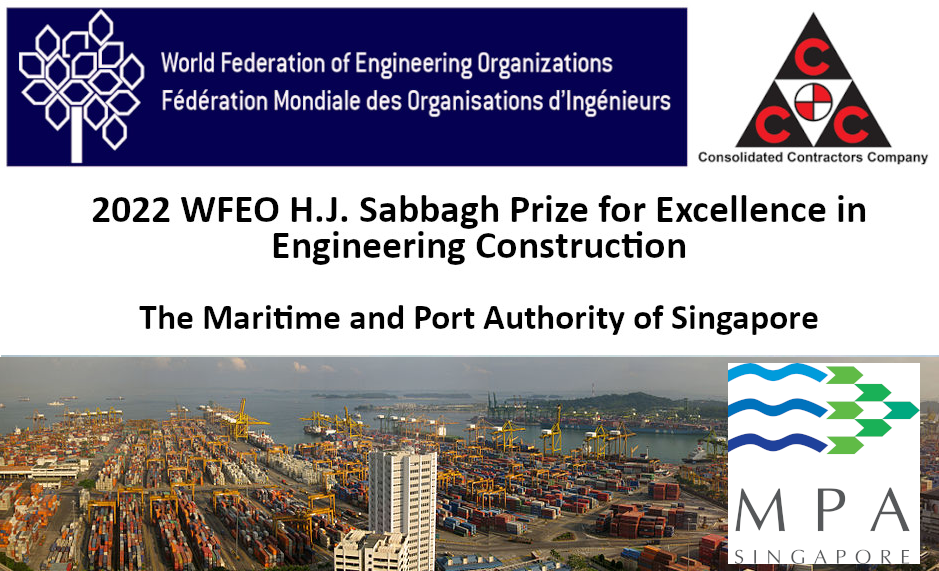
The World Federation of Engineering Organizations (WFEO) is proud to announce the laureate of the 2022 edition of its annual Prize for Excellence in Engineering Construction, kindly supported by the Consolidated Contractors Company (CCC) and named after Hassib J. Sabbagh.
After careful assessment by members of the WFEO Awards Committee, conducted under its chair’s authority (Eng. Ania Lopez), and endorsement by the WFEO Executive Council,
the prize was awarded to the Maritime and Port Authority of Singapore (MPA), for its completion of the reclamation work of the Tuas Port.
The Jury has selected this project in consideration of many remarkable features, including the excellence of the team of nominated engineers in solving complex infrastructure technical issues, the vision in building this large-scale infrastructure project for productivity enhancements while taking a wise and careful approach to environmental and sustainability aspects.
MPA has chosen to generously donate the USD 10,000 prize of its award in favor of WFEO engineering education projects, similarly to past laureates of the Prize. WFEO is grateful for this donation, especially as its activities in the field of education has become increasingly important in recent years, with the development of joint mentoring programs with the International Engineering Alliance and UNESCO, to help national engineering education systems to reach the highest standards.
MPA’s kind donation will support WFEO’s joint climate change education program in Small Islands Developing States (SIDS), in cooperation with UNESCO and the Office for Climate Education (OCE), which is currently conducting schools and educators training sessions on climate change in Fiji and Mauritius.
Er Tham Wai Wah, Chief Engineer/Senior Director (Engineering & Project Management) and Chief Sustainability Officer of MPA, said, “We are honoured to receive this award, and proud of our engineers and site teams for their creativity, resilience and hard work in adopting energy saving construction and the circular use of dredged and excavated soils for the Tuas Port Phase 1 project, and completing the works on schedule amidst the COVID-19 pandemic. We are excited to be contributing to Singapore’s Next Generation Port in Tuas that will be intelligent, sustainable and green.”
WFEO’s Executive Board and Council members send their sincere congratulations to the Maritime and Port Authority (MPA) of Singapore for being awarded the 2022 WFEO-CCC H.J. Sabbagh Prize.
The Tua Port Phase 1 project has been selected amongst other very remarkable projects by the independent judging panel that WFEO’s Awards Committee had set up. We are proud that this award recognizes such an important contribution in the engineering construction field, with a strong commitment to innovation, sustainability and service to the community.
WFEO is also very grateful to MPA for donating the award’s cash prize to its engineering education activities. This donation will serve strategic projects such as monitoring and mentoring of engineering education systems, educators training, and developing the training portal WFEO Academy, that provides free training webinars to members of WFEO member institutions in some 100 countries.
About the Laureate’s selected project
The completion of the Tuas Port Phase 1 project marked a significant milestone in the Tuas Next Generation Port development, which would be the largest fully automated containerised port in the world, capable of handling 65 million twenty-foot equivalent units (TEUs).
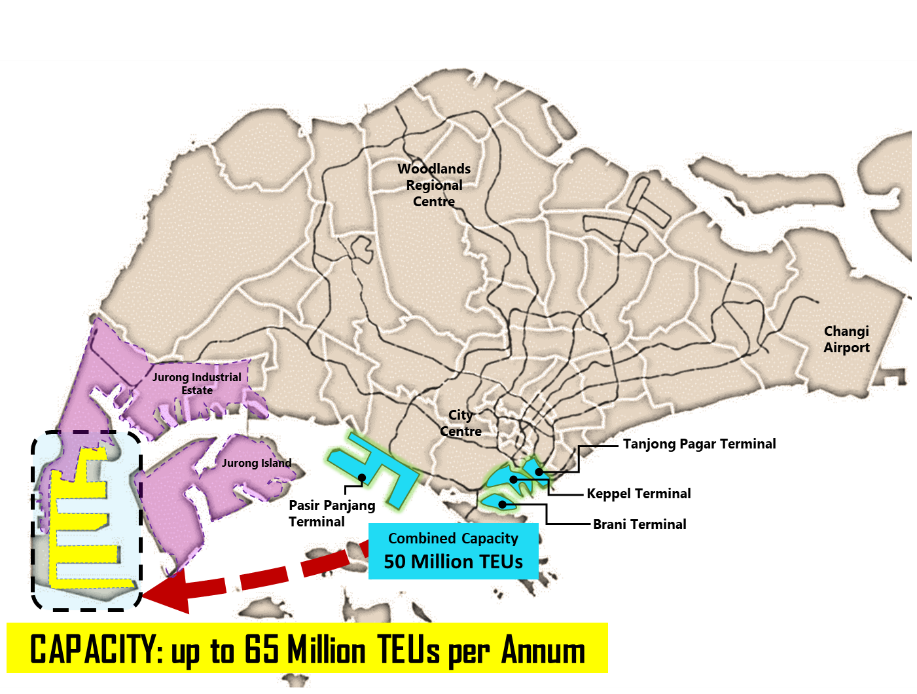
The Tuas Port Phase 1 project entailed the fabrication of 221 10-storey high caissons, construction of 8.6 km of wharf, soil improvement of 414 Ha of land of which 294 Ha were newly reclaimed dredging of the Temasek Fairway and Tuas Basins to – 23 m Chart Datum, and involved a total of 34 million man-hours, with the support of over 450 companies.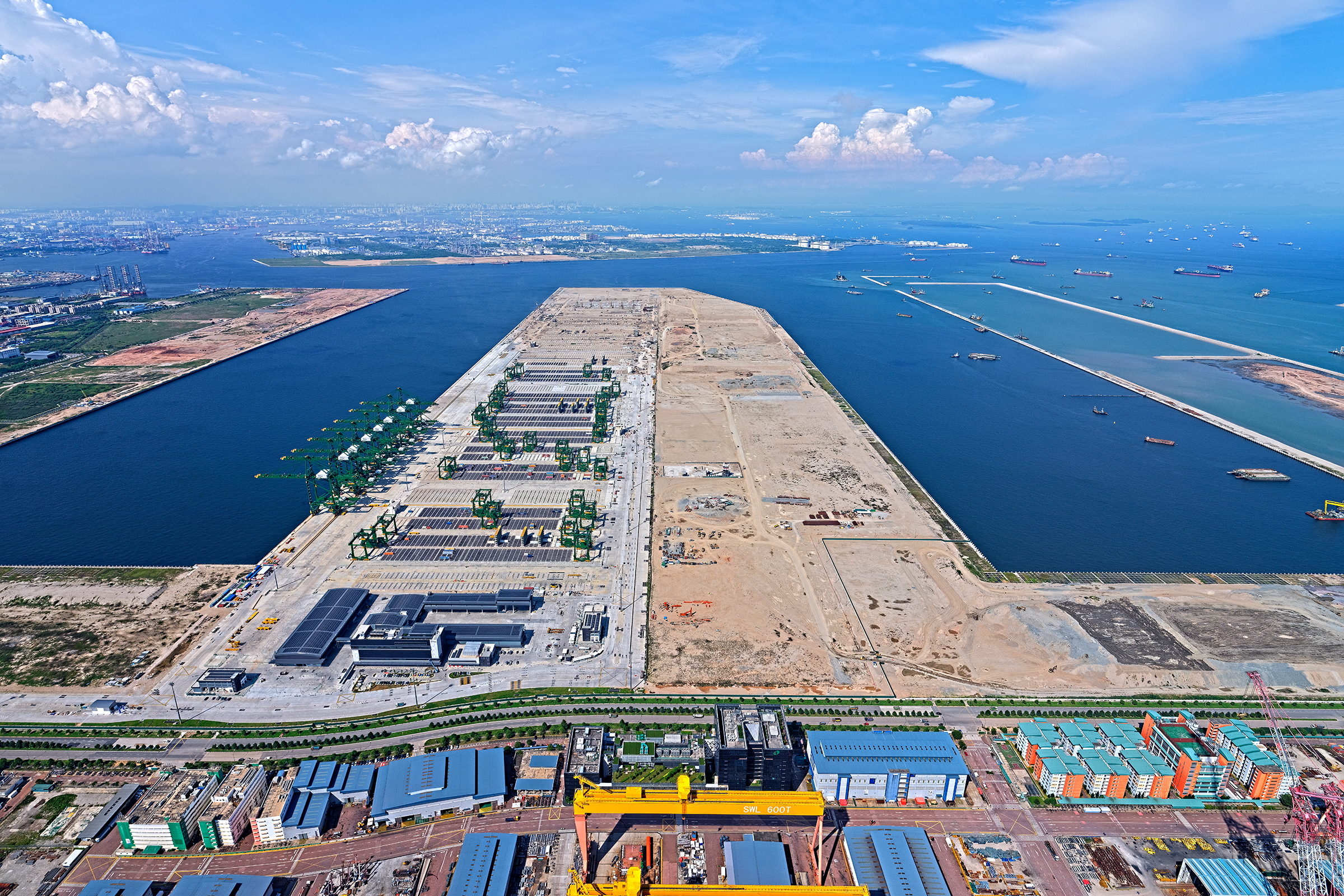
Overview of Tuas Port Phase 1 (TPP1)
The project contributed significantly to Singapore’s social and economic development with sustainability integral to its construction. Tuas Port Phase 1 is recognised for adopting several innovative and sustainable engineering solutions and green initiatives to protect the environment and reduce carbon footprint while pioneering numerous technological initiatives and building local capabilities.
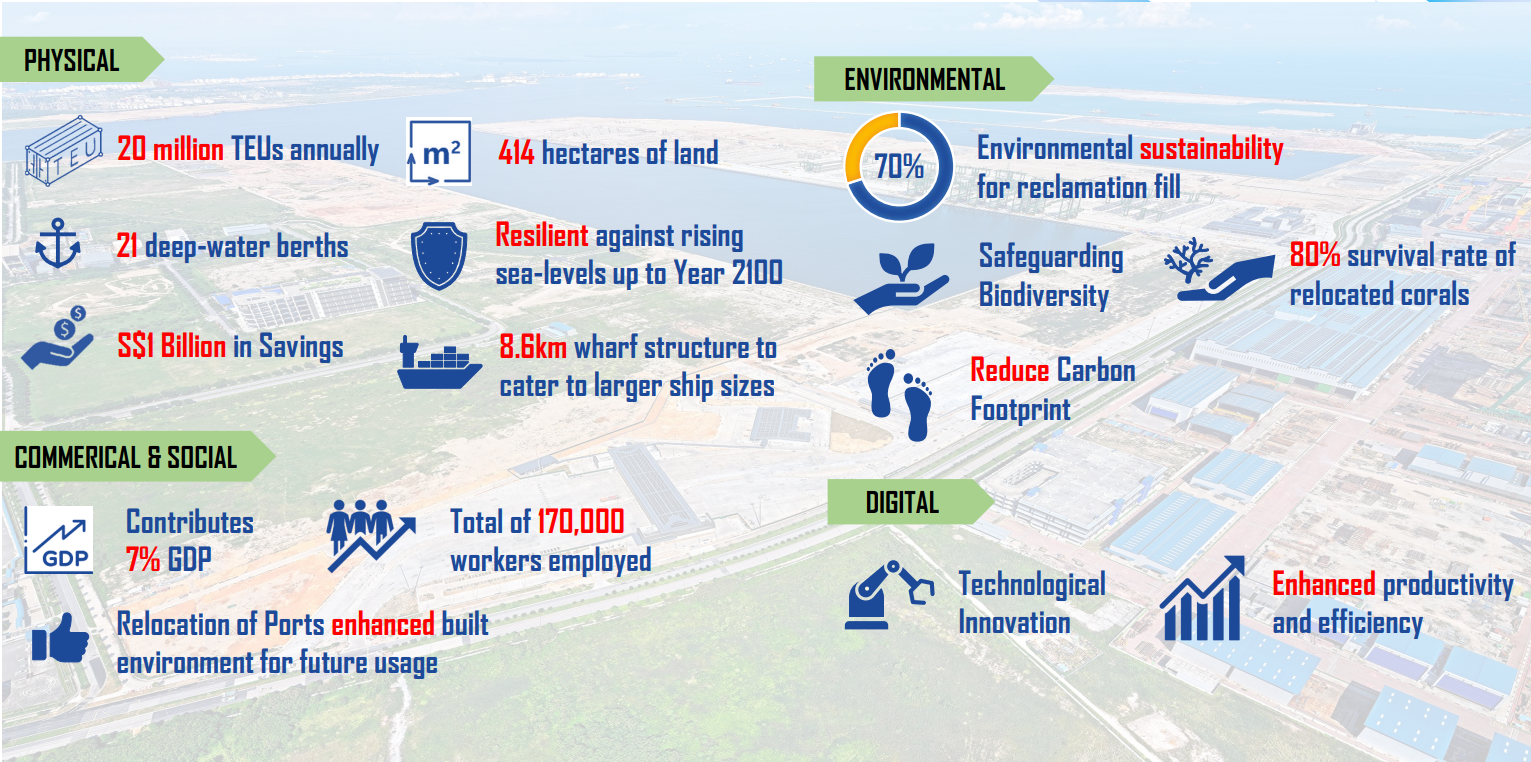
About the Laureate
The Maritime and Port Authority of Singapore (MPA) was established on 2 February 1996 with the mission to develop Singapore as a premier global hub port and international maritime centre, and to advance and safeguard Singapore’s strategic maritime interests. MPA is the driving force behind Singapore’s port and maritime development, taking on the roles of maritime and port regulator and planner, international maritime centre champion and national maritime representative. MPA partners with industry, research community and other agencies to enhance safety, security and environmental protection in our waters, facilitate maritime and port operations and growth, expand the cluster of maritime ancillary services, and promote maritime digitalisation and decarbonisation, R&D and manpower development. MPA is responsible for the overall development and growth of the maritime domain and Port of Singapore. In 2022, Singapore remained one of the world’s busiest transshipment hubs with a container throughput of 37.3 million 20- foot equivalent units (TEUs).
About the WFEO H.J. Sabbagh Prize for Excellence in Engineering Construction
The purpose of this Award, as for all WFEO’s Awards, is to direct the world’s attention to the role of engineering in sustainable development.
The Consolidated Contractors Company, under the leadership of the late Hassib J. Sabbagh, gave the World Federation of Engineering Organizations (WFEO) responsibility for organizing the Hassib J. Sabbagh Award for Engineering Construction Excellence.
This Award was instituted in 2002 by the initiative and endowment of Hassib J. Sabbagh who devoted many years of concern and effort in the area of engineering and construction.
The Award consists of a medal, a certificate, and a cash prize of $10,000 (USD) and is usually presented in conjunction with the biennial General Assembly of the WFEO.
The first presentation was given during the WFEO General Assembly in Tunis, Tunisia, in October 2003.The Award rewards a specific construction project, with special consideration given to projects completed amid the Covid-19 outbreak, and to projects with a strong focus on technological innovation, sustainability and resilience.
Nominations shall be made either by construction project managers, or by the contractor company itself.
The nominee shall be an engineer or a team of (max. 4) engineers responsible for the construction project.
The Consolidated Contractors Company
From its beginning in 1952, the Consolidated Contractors Company (CCC), better known as CCC, has become the largest engineering and construction company in the Middle East. CCC is nevertheless truly international with active projects in countries spread over the Middle East, Africa, Caribbean and the CIS countries with related additional investments in Europe and the United States. CCC provides Project Management, Engineering, Procurement and Construction (EPC) Services. CCC’s services today encompass a broad range of activities such as:
- Complete Construction of Petrochemical Plants and Refineries, Oil Loading and off-loading Terminals and Storage Facilities, Heavy and Light Industrial Plants. CCC is a pioneer in executing Plant Construction on a partnership basis with International Engineering Companies;
- Heavy Civil Construction of Power and Desalination Plants, Water Treatment Plants and Distribution Systems, Sewage Treatment Plants and Collection Networks, Dams and Reservoirs, Harbors and Docks, Airports, Bridges and Highway Interchanges, Roads and Highways;
- EPC of high-Quality Buildings, Industrial Buildings, Infrastructure Works and Networks;
- EPC of Water, Oil and Gas Pipelines.
The World Federation of Engineering Organizations
The World Federation of Engineering Organizations is the peak body for the professional engineering institutions. Founded in 1968, we have national members from about 100 countries representing some 30 million engineers. We work with the UN and other international institutions, to address issues relating to engineering, promote globally agreed good practice and to address the challenges of sustainable development around the world.
Through these activities, we regularly engage with governments, policy-makers and United Nations leaders to present the engineering perspective. We are a member of the United Nations Social and Economic Council and we co-lead the United Nations Scientific and Technological Major Group. We are an official partner of UNESCO and our secretariat is based at their headquarters in Paris.
For more information:Article “Tuas Port Phase 1 project recognised with triple awards” on DredgingToday.com
- 2021 Awards
-

The WFEO awarding ceremony was held on Tuesday 12 April 2022.Opening:
Prof. Gong Ke, WFEO Immediate past PresidentWelcome address:
Dr. Shamila Nair-Bedouelle, UNESCO Assistant Director-General for Natural SciencesModerator:
Ania Lopez, chair of the Awards Committee and member of the WFEO Executive CouncilLaureate of the WFEO Gree Women in Engineering Award:
Wai Yie Leong (Malaysia)Laureate of the WFEO Medal for Engineering Excellence:
Neil MacLeod (South Africa)Laureates of the WFEO Medal for Excellence in Engineering Education:
Enzo Siviero (Italy)
Kai Sang LOCK (Singapore)Closing:
Prof. José Vieira, WFEO President
The recording is available by clicking on the below image.

For more information:
The WFEO awarding ceremony flyer
LEONG Wai Yie
IR Prof. Dr. LEONG Wai Yie is from Malaysia. She is the Director of Research Excellence at Perdana University Malaysia. Wai Yie is currently the Immediate Past Chairperson of The Institution of Engineering and Technology (IET Malaysia Local Network) and Council Member of IET UK, the Vice President of the Institution of Engineers Malaysia (IEM), Vice President of International Network of Women Engineers and Scientists (INWES), and Committee Member of World Federation of Engineering Organisation (Women in Engineering Committee).
LEONG received her PhD in Electrical Engineering from The University of Queensland (UQ), Brisbane, Australia in 2005. She specialises in medical signal processing, Industrial Revolution 4.0 technology, 5G and telecommunications.
She has ranked the UN-WOMEN Award in Leadership 2021 (First Runner), Ten Outstanding Young Malaysian 2017, Top Research Scientists Malaysia 2017, ASEAN Meritorious Service Award 2017, Smart-State-Smart-Women Award presented by Queensland Government, Australia, in 2005.
Neil MacLeod
Neil Mac Leod has been working as a civil engineer, specialising in the provision of water and sanitation services, for almost 50 years and spent 22 years as the head of the public water and sanitation utility that provides water and sanitation services to more than 3.7 million people living in the Durban metropolitan area, South Africa. The utility received the Stockholm Industry Water Award in 2014 for its transformative and inclusive approach in providing water and sanitation and was recognised as one of the most progressive utilities in the world and the most innovative in Africa. After retiring from this position in 2014, he began consulting internationally.
He is an Honorary Fellow of the South African Institution of Civil Engineering and served as the President in 2007, an Honorary Fellow of the Institute of Municipal Engineering of Southern Africa, a Fellow of the South African Academy of Engineering and a Fellow of the International Water Association.
Enzo Siviero
Prof. Ing. Arch HC. Enzo Siviero is a full professor of Bridges at the University IUAV of Venice until October 2015. Actually rector of eCampus University Novedrate, Como, Italy.
Consultant Professor in China: College of Civil Engineering of Tongji University, Shanghai, Adjunct Professor at Fuzhou University and Chang’An University, Xi’An.
Member of CUN, National University Council at the Ministry of Education in Rome (2007-2016).Awarded the honorary degree in Architecture by Politecnico di Bari in 2009.
Known as bridge designer, his traveling exhibition Bridging Ponteggiando is internationally recognized as an excellent synthesis between educational research and profession.
In the last decades organizer of many international workshops and conferences. Currently invited as keynote speaker in various colloquium around the world.
Member of the Board of CMU (Community of Mediterranean Universities), Deputy Secretary General of EAMC (Engineering Association of Mediterranean Countries) and Vice-President of SEWC (Structural Engineers World Congress).Kai Sang LOCK
Professor Kai Sang LOCK is an Emeritus President of the Institution of Engineers, Singapore (IES). His professional career is equally split between the academia and the industry. He was a faculty at the Department of Electrical Engineering, National University of Singapore for 17 years when he left to set up his consulting practice in 1997. He returned to the academia in 2016 as a Professor (Engineering) at Singapore Institute of Technology (SIT) where he is concurrently the Head of the Energy Efficiency Technology Centre.
As the Deputy Chair of the Washington Accord, he is committed to working with WFEO to enhance the quality and relevance of engineering education through the outcome-based accreditation system building upon the jointly developed benchmark: IEA-WFEO Graduate Attributes and Professional Competencies. He is a practicing electrical professional engineers and served as a Board Member of the Professional Engineers Board (PEB), Singapore for 14 years. He chaired the examination committee at PEB to set up the examination system to qualify the registration of professional engineers.
He helped to build up Singapore’s ecosystem and professional competency in energy efficiency and sustainability, having served as the Chairman of the Accreditation Committee for the Energy Services Companies since 2005. He is also the Co-Chair of the Steering Committee for the Singapore Certified Energy Managers Scheme which has graduated about 1,500 competent energy managers. He was conferred the Public Service Star award in 2020 by the President of the Republic of Singapore for his distinguished contribution in energy efficiency and sustainability.
2021 WFEO GREE Women in Engineering Award

INTRODUCTION
As the peak international body for engineers, the World Federation of Engineering Organizations is proud to promote diversity, inclusion, and gender equality in engineering. During its 50th Anniversary celebration at UNESCO headquarters in Paris in March 2018, WFEO was proud to announce, with its sponsor GREE Electric Appliances, a new Award to bring recognition and visibility to outstanding women engineers. The Award recognises women engineers who have shown professional excellence and impact in their work, and are role models and leaders in their field.
The WFEO GREE Women in Engineering Award is awarded every year.
Nominations are invited for outstanding women engineers who have made a significant contribution to engineering.Nominations can be by proposed by an institution such as a university, engineering institution or association, corporate entity or other organisation. Nominations need to be approved by the President, Chief Executive, head of department in a university or equivalent of the institution. Nominations and support letters from members orgnizations or associates of WFEO will be highly regarded.
Self-nominations are not accepted.The Award consists of a medal, a certificate, and a cash prize of $1,000 (USD).
Nominations are closed.GREE ELECTRIC APPLIANCES INC. OF ZHUHAI, CHINA
GREE Electric Appliances, Inc. of Zhuhai is a diversified international industrial group, whose business covers residential air conditioners, central air conditioners, intelligent equipment, home appliances, air source water heaters, smart phones, , home appliances, refrigerators, etc. In 2015, GREE ranked No. 385 in Forbes Global 2000 and No. 1 in household appliances industry.
THE WORLD FEDERATION OF ENGINEERING ORGANIZATIONS
The World Federation of Engineering Organizations is the peak body for the professional engineering institutions. Founded in 1968, we have national members from about 100 countries representing some 30 million engineers. We work with the UN and other international institutions, to address issues relating to engineering, promote globally agreed good practice and to address the challenges of sustainable development around the world.
Through these activities, we regularly engage with governments, policy-makers and United Nations leaders to present the engineering perspective. We are a member of the United Nations Social and Economic Council and we co-lead the UN Science and Technology Major Group. We are an official partner of UNESCO and our secretariat is based at their headquarters in Paris.
WHO CAN BE NOMINATED ?
Any woman with a degree in engineering, currently active in engineering and with records of activities in one or several professional fields related to engineering: industry, consultancy, entrepreneurship, academia, public sector, NGOs.
EVALUATION PROCESS AND CRITERIA
- The WFEO Awards Committee members will give mandate to an independent International Jury, which shall include representatives from Gree Electric Appliances, UNESCO Natural Sciences Sector, and at least three national or international professional engineering institutions.
- Following the Jury’s assessment of nominees, the Chair of the Awards Committee will make an awardee recommendation to the WFEO’s Executive Board, for final announcement by WFEO’s President.
The Award Committee will reward a woman engineer, meeting at least one of the following criteria and as much as possible all of them:
- Outstanding accomplishment in technical fields of engineering
- Outstanding leadership in engineering
- Outstanding contribution to the attraction, mentoring and support of women in engineering
- Outstanding entrepreneurship in an engineering field and development of an organisation with significant technical or social impact
- In each case. evidence of these accomplishments should be provided e.g. patents, publications, organisation performance, evidence of leadership positions, supporting references etc.
A Member economy whose nomination was successful for the award in the year before will not be allowed to nominate any candidate in the following year (i.e. there shall be a lapse of one year for next nomination from the same economy).
WFEO 2021 Medal of Excellence in Engineering Education
The award’s recipient shall be an engineer as defined by the relative standards of the nominating WFEO member organization.
Nominations are closed.
The WFEO Awards Committee will set up and independent International Jury to make its recommendation to the WFEO Executive Board for ratification.
The Medal’s recipient will be notified in fall 2021. The laureate will be presented during WFEO’s General Assembly in San José, Costa Rica.The WFEO Medal of Excellence in Engineering Education was created in Madrid, in November 1999, during the 18th General Assembly of WFEO. The Medal was to be presented biennially hereafter, helping direct world attention to the importance of continuing improvement in the quality, delivery and relevance of engineering education and training. There is no honorarium or stipend associated with the award.
Award Criteria: The recipient will be chosen based on his or her noteworthy contributions to the improvement of engineering education. Special consideration will be given to outstanding services rendered by educators to engineering educational institutions, and to those involved in the education of engineers. Nominees should possess appreciable experience in the profession as well as significant educational accomplishments.
THE WORLD FEDERATION OF ENGINEERING ORGANIZATIONS (WFEO)
The World Federation of Engineering Organizations is the peak body for the professional engineering institutions. Founded in 1968, we have national members from about 100 countries representing some 30 million engineers. We work with the UN and other international institutions, to address issues relating to engineering, promote globally agreed good practice and to address the challenges of sustainable development around the world.
Through these activities, we regularly engage with governments, policy-makers and United Nations leaders to present the engineering perspective. We are a member of the United Nations Social and Economic Council and we co-lead the UN Science and Technology Major Group. We are an official partner of UNESCO and our Secretariat is based at their headquarters in Paris.
WFEO 2021 Medal of Engineering Excellence
The award’s recipient shall be an engineer as defined by the relative standards of the nominating WFEO member organization.
Nominations are closed.
The WFEO Awards Committee will set up and independent International Jury to make its recommendation to the WFEO Executive Board for ratification.
The Medal’s recipient will be notified in fall 2021. The laureate will be presented during WFEO’s General Assembly in San José, Costa Rica.The first presentation of the World Federation of Engineering Organizations (WFEO) Medal (the Engineering Achievement Award) was made in September 1989 in Prague, during the 12th General Assembly of WFEO. The Medal was to be presented biennially hereafter, helping direct world attention to the practice, theory and public contributions of engineering. There is no honorarium on stipend associated with the award.
Award Criteria: The recipient will be chosen based on his or her noteworthy contributions to the practice, theory, or public status of engineering. Nominees should possess appreciable experience in the profession, international standing as well as significant leadership in either business, non for profit or academic sector. A special attention will be given to nominees who have shown notable accomplishments in relation to any of the 17 UN Sustainable Development Goals.
THE WORLD FEDERATION OF ENGINEERING ORGANIZATIONS
The World Federation of Engineering Organizations is the peak body for the professional engineering institutions. Founded in 1968, we have national members from about 100 countries representing some 30 million engineers. We work with the UN and other international institutions, to address issues relating to engineering, promote globally agreed good practice and to address the challenges of sustainable development around the world.
Through these activities, we regularly engage with governments, policy-makers and United Nations leaders to present the engineering perspective. We are a member of the United Nations Social and Economic Council and we co-lead the UN Science and Technology Major Group. We are an official partner of UNESCO and our Secretariat is based at their headquarters in Paris.
- 2020 Awards
-
WFEO GREE Women in Engineering Award 2020
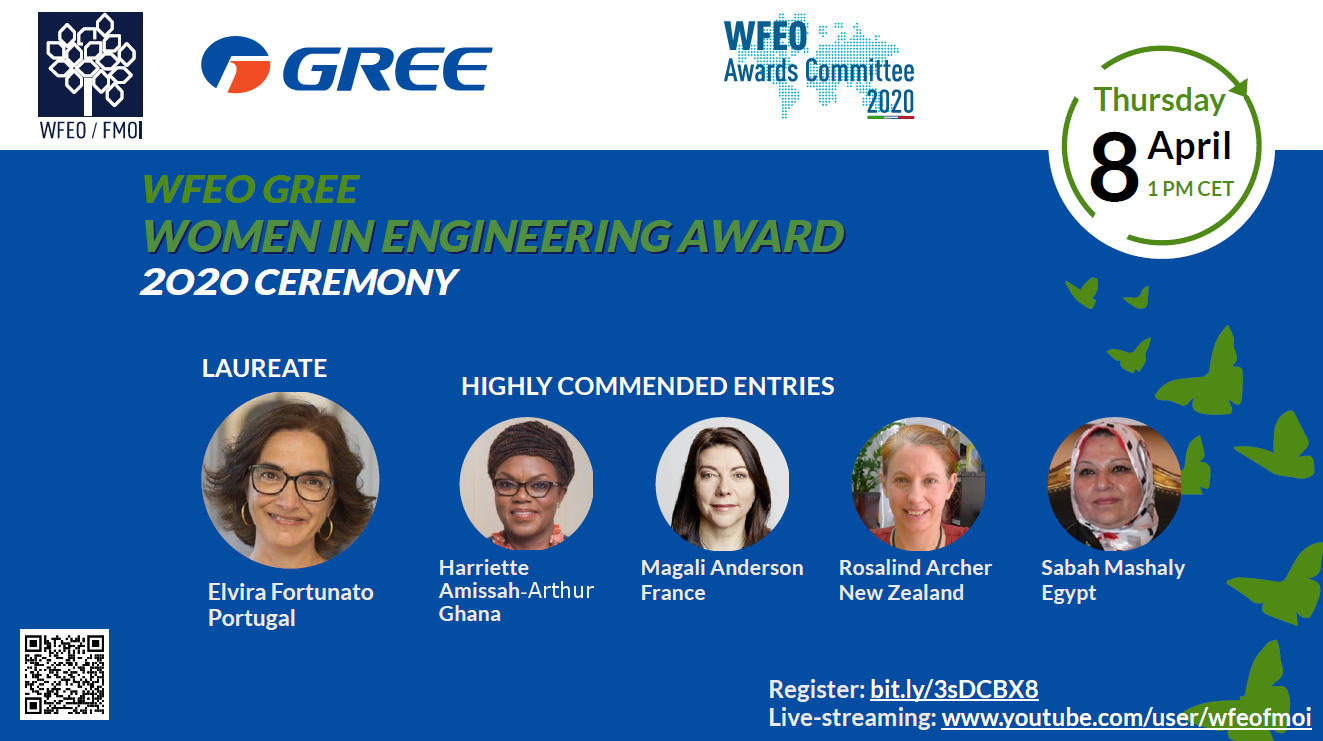
The World Federation of Engineering Organizations (WFEO), the peak international body for engineering institutions, is proud to promote diversity, inclusion, and gender equality in engineering.
The WFEO GREE Women in Engineering Award, was first announced during WFEO’s 50th Anniversary celebration at UNESCO headquarters in Paris in March 2018, with its sponsor GREE Electric Appliances. This is the first global Award to acknowledge and give visibility to outstanding women engineers, for their professional excellence and contribution to engineering for the good of people and planet.
The WFEO GREE Women in Engineering Award is awarded every year.
Nominations were invited for outstanding female engineers who have made significant contributions to engineering. Nominations have been submitted by an institution such as a university, an engineering institute or association, a corporate entity, or a national and international organization.
The International Jury consisted of:
- Maria Prieto Laffargue, WFEO Past President (Chair),
- Peggy Oti Boateng, UNESCO Director for Science Policy and Capacity Building,
- José Vieira, WFEO President elect,
- Blair Min, representing GREE Electric Appliances,
- Ania Lopez as Chair of the Awards Committee (observer).
The Jury completed its evaluations to the nominated candidates from different continents and various engineering fields, independently and anonymously, according to the set award criteria, i.e.:
- Outstanding accomplishment in technical fields of engineering,
- Outstanding leadership in engineering,
- Outstanding contribution to the attraction, mentoring and support of women in engineering,
- Outstanding entrepreneurship in an engineering field and development of an organization with significant technical or social impact.
The 2020 WFEO GREE Women in Engineering Award winner is Ms. Elvira Fortunato from Portugal.
The WFEO Awards Committee recognized with Highly Commended Entries, four more nominees, thus extending this important award on a multi-continental level:- Ms. Harriette Amissah-Arthur from Ghana.
- Ms. Magali Anderson from France.
- Ms. Rosalind Archer from New Zealand.
- Ms. Sabah Mashaly from Egypt.
The Awarding Ceremony has been organized on Thursday 8 April, 1 PM CET.
The recording is available by clicking on the below image.
Winner
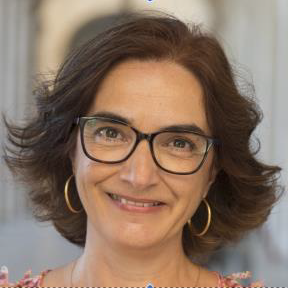 Elvira Fortunato is a Portuguese engineer and scientist with a top academic profile. She has a specialization in material science and has led breakthrough research in nanomaterials, microelectronics and material engineering. She is worldwide recognized as the inventor of transparent electronics and paper electronics, with highly regarded publications and significant patents. She is vice-rector of Nova University of Lisbon and holds many positions in academic and the boards of technological institutions.
Elvira Fortunato is a Portuguese engineer and scientist with a top academic profile. She has a specialization in material science and has led breakthrough research in nanomaterials, microelectronics and material engineering. She is worldwide recognized as the inventor of transparent electronics and paper electronics, with highly regarded publications and significant patents. She is vice-rector of Nova University of Lisbon and holds many positions in academic and the boards of technological institutions.
More information on this page.Highly Commended laureates
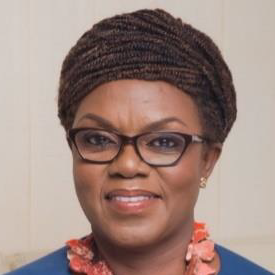 Harriette Amissah-Arthur is an experienced electrical engineer from Ghana, co-founder and partner in a consulting company. She has held important positions in national corporations and authorities in the energy sector and conducted many projects, including power plants building and management, including a 18 year service at the Volta River Authority.
Harriette Amissah-Arthur is an experienced electrical engineer from Ghana, co-founder and partner in a consulting company. She has held important positions in national corporations and authorities in the energy sector and conducted many projects, including power plants building and management, including a 18 year service at the Volta River Authority.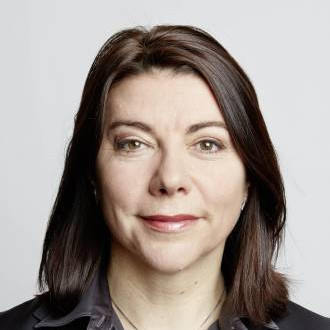 Magali Anderson, a French citizen, is Chief Sustainability and Innovation Officer and member of the Executive Council of the LafargeHolcim cement group, and CEO of Lafarge SA. She has a long experience of oil field engineering in various countries, mainly with the Schlumberger Group.
Magali Anderson, a French citizen, is Chief Sustainability and Innovation Officer and member of the Executive Council of the LafargeHolcim cement group, and CEO of Lafarge SA. She has a long experience of oil field engineering in various countries, mainly with the Schlumberger Group.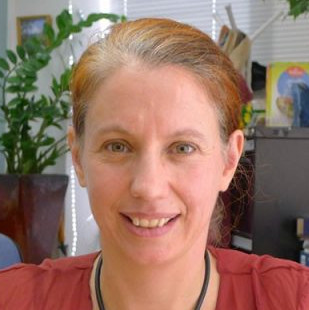 Rosalind Archer is a New Zealander reservoir engineer, an academic leader with a specialization on computational earth science, and a company director. She is about to step up as President of Engineering New Zealand.
Rosalind Archer is a New Zealander reservoir engineer, an academic leader with a specialization on computational earth science, and a company director. She is about to step up as President of Engineering New Zealand.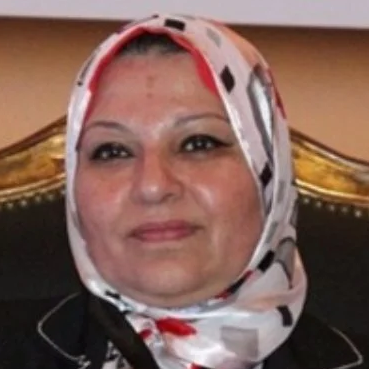 Sabah Mashaly is an Egyptian electrical engineer with 30+ years of technical and leadership experience in the utility sector. In 2019, she was appointed as Chairwoman and Managing Director of the Egyptian Electrical Transmission Company, with 33,000 employees.
Sabah Mashaly is an Egyptian electrical engineer with 30+ years of technical and leadership experience in the utility sector. In 2019, she was appointed as Chairwoman and Managing Director of the Egyptian Electrical Transmission Company, with 33,000 employees.For more information:
The awarding ceremony press release
Celebrating the Achievements of Young Engineers Around the World

As part of the celebrations for World Engineering Day, the World Federation of Engineering Organisations’ Young Engineers/Future Leaders Committee collaborated with Global Engineering Futures, a group of young engineers from engineering organisations and universities, to run a competition for early-career engineers from around the world. The goal of the competition was to highlight the work of young engineers and their engineering achievements in advancing the UN Sustainable Development Goals.
Young engineers, aged under 35 years on 31 December 2020, were invited to submit proposals and to present their ideas and perspectives on one of the 17 Sustainable Development Goals. These goals take an integrated approach to future development, combining progress in economic prosperity, social inclusion, and environmental sustainability. The implementation of these goals is central to the celebrations of the first UNESCO World Engineering Day.
The projects were judged on the impact of the project on achieving one or more of the targets underlying the United Nations Sustainable Development Goals, the leadership and contribution of the author, and the level of innovation in addressing the underlying problem.
More than 400 young engineers from more than 70 countries, including some from the leading engineering universities of the world, showcased their projects to advance sustainable development through engineering as part of this competition aligned with UNESCO World Engineering Day.
Our thanks to all young engineers participated in this competition, their work for achieving the UN Sustainable Development Goals are highly appreciated. Our thanks also to the students, researchers and faculty members at Imperial College London and Nankai University, Tianjin, and Global Engineering Futures, Institution of Chemical Engineers (IChemE) UK, representatives of Young Engineers Europe and the WFEO Young Engineers/Future Leaders Committee, who contributed significant hours as volunteers to develop this project and bring it to fruition.
Thanks also to the judging team and academics who gave valuable advice during the process. Projects were judged for the impact of the project on achieving one or more of the targets underlying the United Nations Sustainable Development Goals, the role of the Project Lead, the level of innovation in addressing the underlying problem and how a solution has been developed. The background of applicants was hidden from judges during this process.
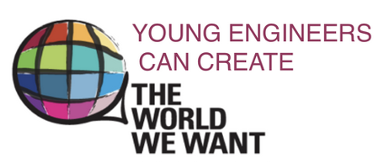 The winning entry and entries that were judged as highly commended are listed below. Highly commended entries are listed in alphabetical order of the author/project lead. Project information is a summary of information that has been provided by the project lead and is being verified. In keeping with the goals of the competition, commercial promotion has been avoided and references to companies, trade names and commercial products have been avoided.
The winning entry and entries that were judged as highly commended are listed below. Highly commended entries are listed in alphabetical order of the author/project lead. Project information is a summary of information that has been provided by the project lead and is being verified. In keeping with the goals of the competition, commercial promotion has been avoided and references to companies, trade names and commercial products have been avoided. Due to COVID-19 and the declaration of the global pandemic, international events hosted by the World Federation of Engineering Organizations, UNESCO and the UN have been cancelled or postponed until further notice. Project leads will be contacted if there are opportunities to present their work at future events.
Overall Winner Project lead: Aida Rafat, Imperial College London UK. SDG 12: Reducing textile waste and reducing pollution from textile dyeing technologies. 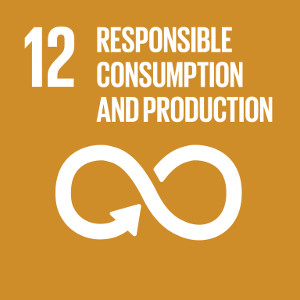
This project is the result of research that solves two grand challenges in the textile industry: textile waste and polluting conventional dyeing technologies. This has been achieved by an innovative technology that enables the reuse and recycle of dyes from textile waste. The technology aims to divert the textile waste from landfill while also eliminating the use of virgin dyes derived from petrochemicals and instead uses textile waste as source of dyes. Decontaminated de-coloured textile fibres can also be recycled to produce new fibres via the fibre-to-fibre recycling technologies. The technology has potential to change the way fabrics are dyed and coloured in the future.
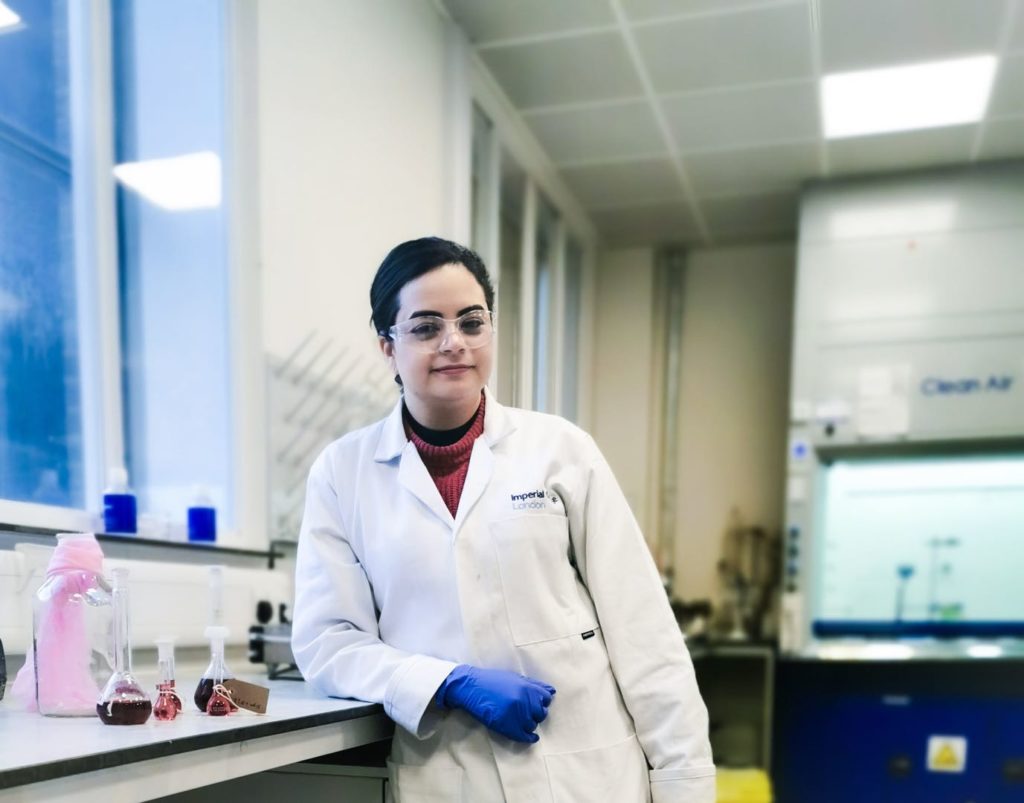
Ms. Aida Rafat in her laboratory at Imperial College, London.
Highly Commended Entries Project lead: Ayusha Abbas, Newcastle University, Newcastle, UK. SDG 3: Reducing maternal mortality with a low cost ultrasound imaging system. 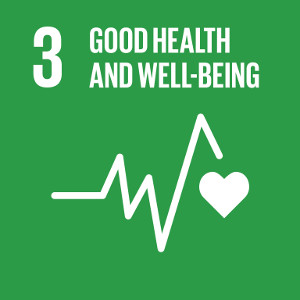
This project comprises the development of a low cost ultrasound imaging device which uses a single piezoelectric element transducer. This design greatly reduces the hardware complexity, power consumption and beamforming computational load compared to conventional devices, lowering its cost. Various estimation techniques have been used to compensate for the constraints of the simple design. Initial experiments have shown promising results for clinical diagnostics, but further work is needed to optimise this algorithm. The design has the potential to deliver affordable technology to detect maternal risk factors and improve the rates of maternal mortality, especially in developing countries.
Project lead: Oscar Calderon Agudo, Imperial College London, UK. SDG 3: Better health outcomes with low cost brain imaging technologies. 
This project has demonstrated that the combination of low-energy low-frequency ultrasound and imaging algorithms used to image the earth subsurface can provide high-resolution brain images. This is leading to the development of a new ultrasound device for brain imaging that will be safe, portable, remotely accessible and affordable. The technology has the potential of improving the health of millions of people with a new and powerful brain imaging tool that can be deployed worldwide at a much lower cost than traditional imaging equipment.
Project lead: Samuel Alexander, Deakin University, Geelong, Australia. SDG 4: Making Education in Science Technology Engineering and Mathematics (STEM) more accessible. 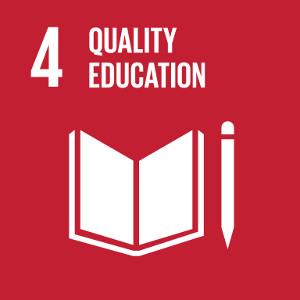
The project lead has developed a learning platform to help students understand computational thinking and create STEM projects in the simplest way possible. To date, toolkits are available to build a programmable device and a desktop PC. The project has been tested in schools in Indonesia to provide low cost products to design a “creative computing” curriculum and provide extracurricular lessons. It has worked with various non-profit organizations to introduce underprivileged children to STEM. The project has attracted boys and girls equally.
Project Lead: Paola Alejandra Saenz Cavazos, Imperial College London, UK. SDG 9: Development of new materials for adsorption of pollutants, waste treatment and carbon capture. 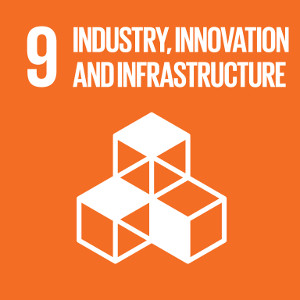
This project involves the development of new adsorbent materials with innovative structures for environmental remediation solutions such as water treatment, removal of organics from waste gas, adsorption of gaseous radionuclides from nuclear power plants, and carbon capture. The project involves fast and accurate material characterization to assess adsorbent performance and their specific capabilities for different applications. The new materials have the potential to reduce emissions from industry sectors such as cement, chemicals, iron and steel, treat drinking water, groundwater and wastewater and reduce air pollution by capturing volatile organic compounds.
Project Lead: Chingakham Chinglenthoiba, National Institute of Technology, Calicut, India. SDG 6: Promoting access to clean water through the development of polymeric membranes to remove pollutants from water. 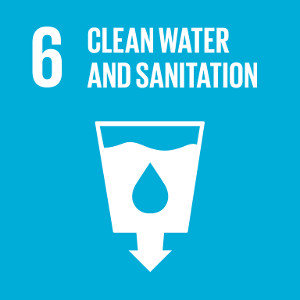
This project comprises the development of a water purification system using a super-oleophilic and anti-bacterial nonwoven nanofibrous nanocomposite membrane. The membranes can selectively separate different oils in oil-water mixtures as well as bacteria found in polluted waters. The current nanofibrous system can be a good candidate for multi-functional oil-water separation as well as an anti-bacterial water filtering membrane.
Project Lead: Emmanuella Ekpoki, Covenant University, Lamingo, Nigeria. SDG 3: Development of a device to detect cardiac symptoms. 
The project consists of the development of a portable device that indicates the type of emergency treatment needed for patients with symptoms of sudden cardiac arrest or with cardiovascular ailments and who are unresponsive and not breathing. It also provides post-resuscitation instructions if the victim is breathing and acquires and detects the Electro-Cardiogram rhythm. It also automatically records and stores rescue data. It can be used to check irregular cardiac rhythm or symptoms of Post-Traumatic Stress Disorder (PTSD). An e-health platform is being developed to enable data sharing between hospitals, and radiology units and has the potential to provide the right treatment and outcomes for patients.
Project lead: Ubong Akpan Essien, Federal University of Technology Minna, Nigeria. SDG 12: Development of composite wood from flamboyant tree seeds and polystyrene wastes. 
The project comprises the development of a wood-polymer composite (poly-wood) and composite ceiling board from flamboyant tree seeds shell and a resin developed from polystyrene wastes. The seeds are currently agro-wastes. The dry seeds shells are crushed to a particle size of 250 μm, mixed with the developed resin moulded and cured. Unlike other composites and usual timber products, the composites had uniform properties in all directions to a large extent. They are potentially a viable alternative to timber and are a possible solution to deforestation.
Project Lead: Sebastian Horstmann, University of Cambridge UK. SDG 11: Promoting sustainable cities and reducing air pollution through citizen monitoring of air quality. 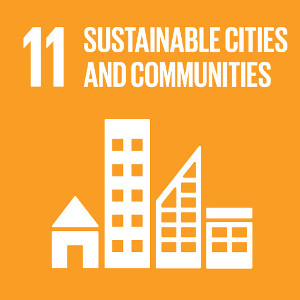
The project has developed a low-cost open-source sensor platform that measures particulate matter and carbon dioxide, geotags the data and transmits it wirelessly. The project helps citizens to build their own affordable sensing kits, mount the mobile sensors on their bikes and measure their air pollution exposure during commutes. With the gathered data, the platform generates street-by-street air quality maps. This potentially enables evidence-based decisions on sustainable cities and urban planning. Pilot studies have been run in Buenos Aires and Nairobi, supported by the UKCAN foundation and funding from the EPSRC and GCRF in the UK.
Project lead: Svetlana Jaghatspanyan, Hi-Tech Gateway LLC, Armenia. SDG 15: Protecting forests through sensor monitoring of forest fires and illegal logging. 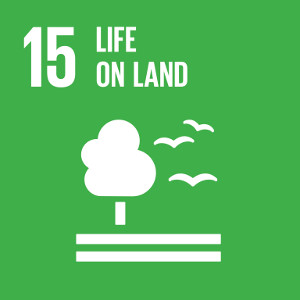
This project involves the development of a smart IoT sensor monitoring system for forests to detect illegal logging and wildfire. The device monitors and sends emergency signals showing clear coordinates on a map. It is very energy efficient and can work up to 6 years with the same batteries. A 6-month test pilot has been completed in Armenia and an industrial prototype is being developed for mass production. The organisation plans to implement the technology in Armenia and Indonesia.
Project Lead: Ahmad Najjaran Kheirabadi, Imperial College London, UK. SDG 7: Use of Diffusion Absorption Refrigeration (DAR) technology for low cost, energy efficient cooling. 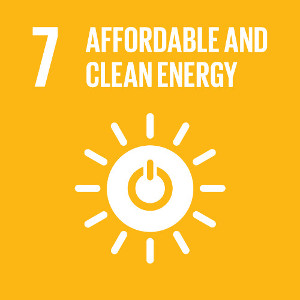
Diffusion absorption refrigeration (DAR) technology is a sorption-based cooling technology that can be driven purely by thermal energy, without any need for electrical or mechanical energy input. It has low noise levels, no moving parts, low construction and maintenance costs, and long operational life. However, DAR systems are typically less efficient than other cooling technologies. This project has developed an alternative working fluid that can enable DAR technology to operate more efficiently and at lower temperatures and which could be used in poor rural areas. Further research and investment is needed to develop this technology.
Project Lead: Shagun Maheshwari, Mojo Vision, Stanford USA. SDG 12: Promoting the Responsible use of resources through development of bio-degradable sanitary products using Chitosan. 
This project comprises the design and development of feminine hygiene sanitary products utilizing a biodegradable Chitosan-based hydrogel embedded in an organic absorbent carrier matrix and a liner made of compostable bioplastics. Engineering a method to incorporate Chitosan into this matrix, while being soft on the skin, has been the challenge. Chitosan is derived from a waste by-product of the shellfish industry (Chitin), making it available in industrial volumes. It helps coagulate blood, is antibacterial and non-toxic in nature. A prototype is being developed with the Myna Mahila Foundation in India which is undergoing limited user testing.
Project Lead: Emma Mamisoa Nomena, University of Amsterdam, Netherlands. SDG 12: Development of bio-degradable plastics using plant based materials. 
The project is the development of plant based plastic packaging material using, soya bean oil, cellulose extracted from citrus peels, a waste product, and curcumin. The ingredients are homogenized under pressure and oven dried to form a film. The resulting material is flexible, translucent, and thermally stable up to 300°C. The flexibility can be adjusted by the proportion of oil used. Films with higher oil concentrations are more flexible. Curcumin enables antioxidant and anti-microbial properties. The films can be recovered and refabricated. The product has the potential to be used as a packaging material in the food and pharmaceutical industries.
Project Lead: Francesca O’Hanlon, University of Cambridge UK. SDG 6: Providing access to clean water through the development of a low cost chlorination system to treat drinking water supplies in Uganda. 
This project involves the design a chlorine injector which requires no electricity or moving parts to function. It inserts the correct amount of chlorine into a clear water supply in order to make it safe to drink in accordance with the World Health Organisation guidelines. The product is ideally suited for rainwater harvesting systems, or municipal water supply taps to kill bacteria and viruses. Local plumbers are trained to fully, and safely dose water with the right amount of chlorine into the water supply, so people can be confident that the water they are drinking is safe. The project has partnered with a team of 25 plumbers in Mbarara Uganda to carry out pilot studies.
Project Lead: Alphonce Ayado Owayo, NTUST, Chinese Taipei. SDG 12: Replacement of conventional sand with waste foundry sand in construction concrete. 
This project replaces sand with waste foundry sand from steel works in building concrete. The concrete made from waste foundry sand was found to perform well I laboratory cube crushing test, slump test and split tensile test. Concrete made from waste foundry sand indicated lower susceptibility to sulphate attack, which is a major advantage for constructions in salty environments. This technology potentially contributes significantly to sustainable construction by reducing environmental degradation through the mining of natural sands and emissions of carbon dioxide into the atmosphere, a process associated with waste foundry sand processing.
Project Lead: Robert Edwin Rouse, University of Cambridge UK. SDG 7: Generation of renewable energy from wave power. 
The project comprises the development of a marine turbine with biomimetic origins, generates energy from wave power whilst filtering out synthetic waste from the oceans. The turbine, has multiple features that work together to maximise the efficiency of power generation and pollution filtration. Through laboratory testing and iterative design, it is able to adjust to the direction of tidal flows and generate electricity in all directions. The technology can be deployed globally, taking advantage of any viable tidal and wave energy source. It has the potential to tap into the power of the oceans whilst restoring the marine environment.
Project Lead: Mai Kim Tran, Rice University, Houston, USA. SDG 12: Development of technology to recycling Li-ion batteries. 
This project comprises the use of environmentally friendly solvents, notably deep eutectic solvents composed of nontoxic, biodegradable compounds like chicken feed additive choline chloride and ethylene glycol, to extract valuable elements from spent batteries so that they can be recycled. It has the potential for thousands of metric tons of recycled material to be added back into the supply chain, thus addressing the growing electronic waste problem. Multiple elements can be dissolved in these solvents, recovered and converted to create new Li-ion batteries for new vehicles.
- 2019 Awards
-
The 2019 Awards have been presented at the Gala Dinner on the occasion of our General Assembly on 23 November 2019 in Melbourne, Australia, during the World Engineers Convention 2019.
The 2019 WFEO GREE Women in Engineering Award
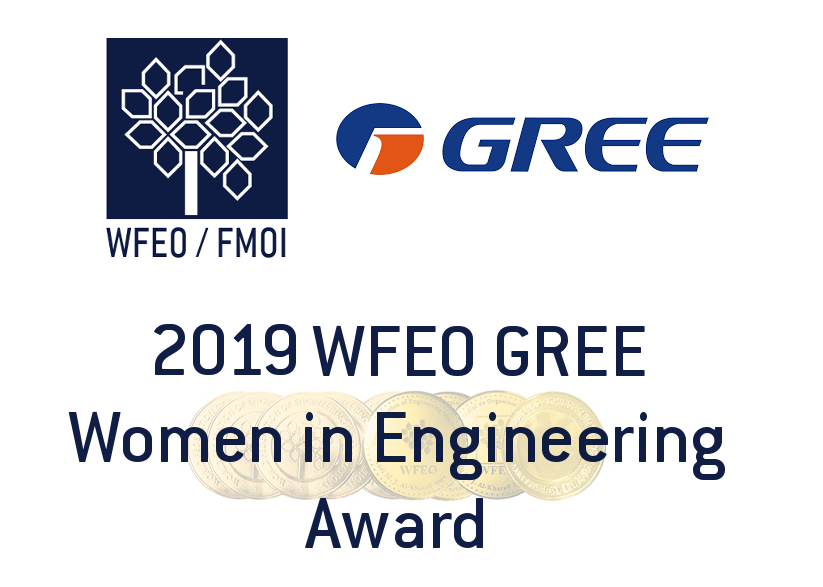 The WFEO GREE Women in Engineering Award, supported by GREE Electric Appliances Co., recognises the contributions of women to engineering at an international level. Outstanding women engineers from around the world nominated for this award.
The WFEO GREE Women in Engineering Award, supported by GREE Electric Appliances Co., recognises the contributions of women to engineering at an international level. Outstanding women engineers from around the world nominated for this award.The winner for the 2019 WFEO GREE Women in Engineering Award is Mrs. Lydia Gonzalez Tansinsin from The Philippines.
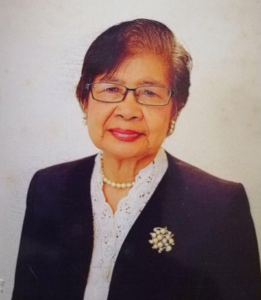 Lydia has been a leading woman engineer in the Philippines and Asia-Pacific region for more than six decades.
Lydia has been a leading woman engineer in the Philippines and Asia-Pacific region for more than six decades.She was Undersecretary (Vice Minister) of the then Ministry of Science and Technology, leading policies and strategies that integrated science and technology in national development.
She has been the leader and founder of national and regional engineering and technology organizations including AFEO, FEIAP, AAET, AETDEW, PTC, and the PTC-Women Engineers Network, the latter encouraging women engineering professionals in practice and services.
The 2019 WFEO Medal for Engineering Excellence
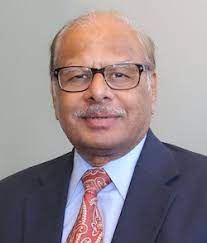 Dr Vilas Mujumdar is awarded the 2019 WFEO medal for Engineering Excellence
Dr Vilas Mujumdar is awarded the 2019 WFEO medal for Engineering Excellence
Dr Mujumdar has been a consulting structural engineer designing facilities and buildings for seismic resilience. He has developed resilience as a systems level approach and has implemented the approach in California.He has contributed to the development of natural hazard design provisions in the International Building Code. He has developed and promoted the goal of resilience against natural hazards, combining engineering and socio-economic sciences. He has created educational opportunities for younger engineers to be educated in resilience and sustainability.
The 2019 WFEO Medal for Excellence in Engineering Education
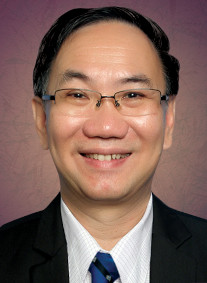 Dr. Chuah Hean Teik is awarded the 2019 WFEO Medal for Excellence in Engineering Education.
Dr. Chuah Hean Teik is awarded the 2019 WFEO Medal for Excellence in Engineering Education.Prof. Chuah is the President of University Tunku Abdul Rahman (UTAR) since 2008. He has developed many education innovations including Soft-Skill Certification for undergraduates for a broader range of capabilities, increasing their employability.
The University has increased its rankings in Asia and internationally under his leadership. He has also led the development of accreditation systems and has mentored economies in Asia and Africa and has conducted training courses on Outcome-Based Education on behalf of the Federation of Engineering Institutions in Asia and the Pacific for academics, assessors and policy makers throughout Asia and the Pacific economies.
The 2019 Hassib J. Sabbagh Award for Engineering Construction Excellence
The purpose of this Award is to direct world attention to the role of engineering in sustainable development. It is sponsored by Consolidated Construction Contractors and was the initiative and endowment of late Hassib J. Sabbagh who devoted many years of concern and effort in the area of engineering and construction. The Award consists of a certificate and a cash prize and is presented at the WFEO General Assembly.
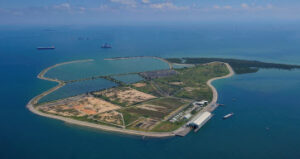 The development of Semakau Landfill addressed Singapore’s land requirement for waste management.
The development of Semakau Landfill addressed Singapore’s land requirement for waste management.Located 8km south of Singapore with an area of 350 hectares, this is the first man-made landfill created entirely from sea space between offshore islands. During construction, great care was taken to ensure biodiversity and nature were conserved. The design involves a single cell, a 200-metre long floating platform and a floating wastewater treatment plant. Semakau Landfill is an example of balancing sustainable waste management with the preservation of ecosystem and biodiversity. More information is available in this page.
- 2018 Awards
-
The 2018 Awards have been presented at the Gala Dinner on 22 October 2018, during the Global Engineering Congress in London.
The 2018 Dr. Zuheir Alami WFEO Award for Engineering Innovation
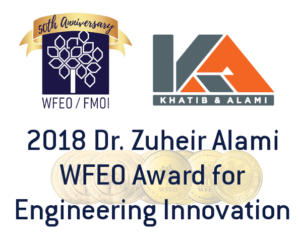 The Dr. Zuheir Alami WFEO Award for Engineering Innovation, supported by Khatib & Alami, recognises the importance of engineering innovation at an international level. Innovative companies from around the world applied for this award.
The Dr. Zuheir Alami WFEO Award for Engineering Innovation, supported by Khatib & Alami, recognises the importance of engineering innovation at an international level. Innovative companies from around the world applied for this award.The winner for the 2018 Dr. Zuheir Alami WFEO Award for Engineering Innovation is Dr. William F. Ranson from the USA.
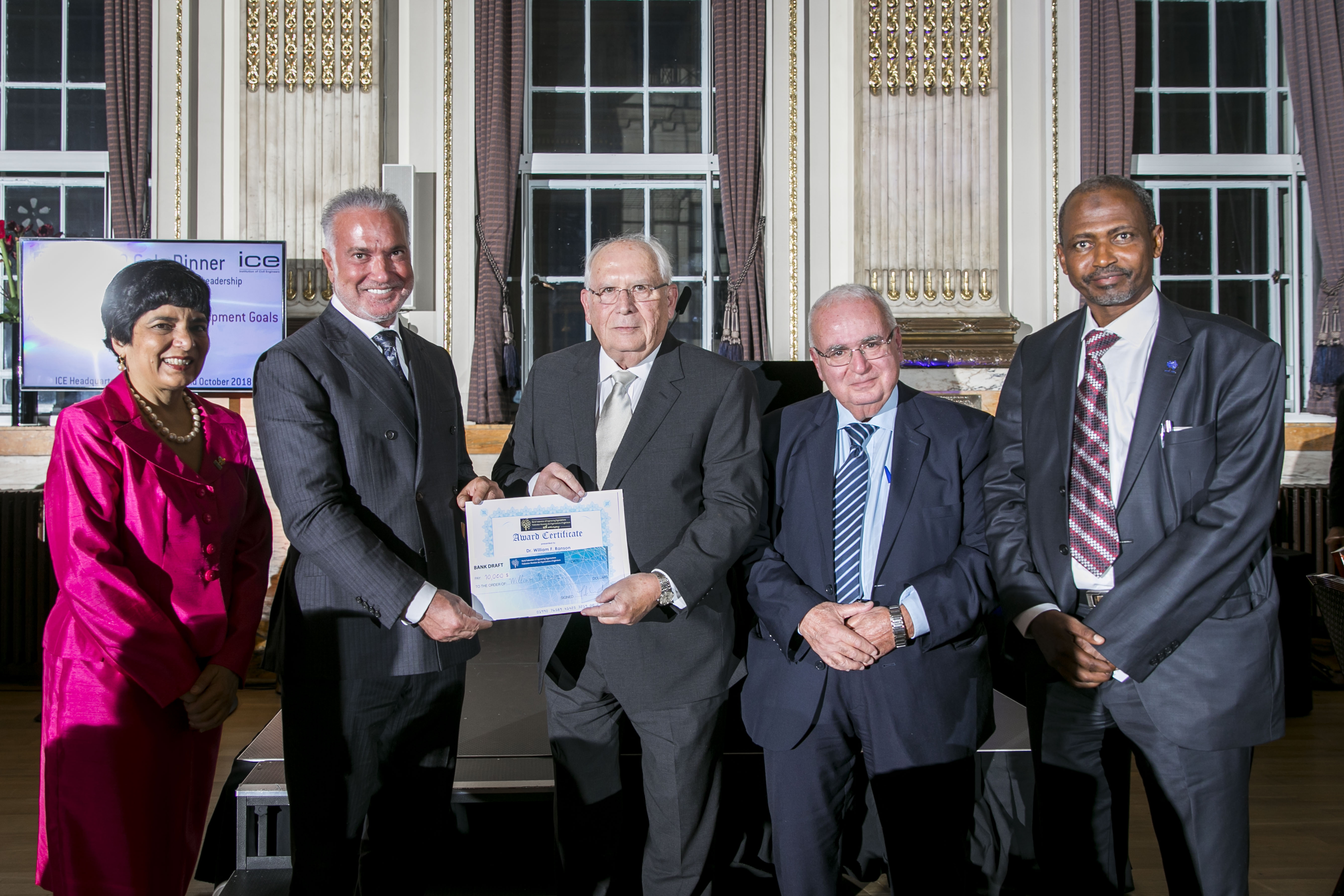 Dr. William F. Ranson (center), winner of the Inaugural Dr. Zuheir Alami WFEO Award for Engineering Innovation
Dr. William F. Ranson (center), winner of the Inaugural Dr. Zuheir Alami WFEO Award for Engineering InnovationAbout the Awardee
Born on 24th June 1938, Dr. Ranson holds a Ph.D. in engineering, a M.S. and Bachelor of Mechanical Engineering. He is a member of ASME International, Society of Experimental Mechanics and is member of the Pan American Academy of Engineering.. Dr. Ranson has authored national-research-award winning publications, and holds several patents.
Dr. Ranson has over 50 years of combined experience in management, business development and R&D. He has led numerous technology development projects for NASA, the Department of Defense, the National Institutes of Health, and large corporations such as Gulfstream Aerospace, Michelin Corporation, and Westinghouse. Dr. Ranson established one of the three original manufacturing extension programs in the United States. This program has grown to 52 centers providing ISO certification, product development, technology integration, and supply-chain management services to a base of 325,000 manufacturing companies. Ranson has founded several startup companies offering products and services in the industrial, medical, and government sectors.
Dr. Ranson has been a chaired professor of mechanical engineering, and is a recognized expert in the area of stress and fatigue analysis of mechanical systems. He has served as consultant and expert witness for many engineering and manufacturing corporations. Dr. Ranson serves as an Advisor for a joint U.S. Army, Army National Guard, Goodrich Aerospace, and University team tasked with managing structural vibration in military helicopters in an effort to reduce cost, eliminate unscheduled maintenance, and improve operational readiness and safety.
He has received awards from the American Society of Mechanical Engineers and the Hetenyi Award for he Society of Experimental Mechanics for original contribution to engineering mechanics
Impact of the Product:
The impact to the global community is an inexpensive technique to measure strain in operating systems, monitor structural health, evaluate crack initiation in rivet holes before surface cracking appears and provides an accurate device operable in a wider temperature range and wide range of elasticity.
Electrical resistance gages must have a particular gage material for a specific temperature range and the electrical resistance gage is limited to 5% strain and the optical gage has been used up to 150% strain. The impact is exemplified by the acquisition of the technology by General Electric.
About the Product
The project is about a technology developed for industrial optical based strain measurements. William’s effort resulted in development of optical strain gauge targeted at replacing the generally used electrical resistance strain gauge. The optical approach eliminates the need for the electrical connection from the strain gauge to the readout device.
The method of attaching the optical sensor and the method of reading the sensor has a number of advantages over x-ray diffraction, ultra-sonic imaging, the electrical resistance strain gauge (as mentioned), fibre optic gauge and digital image correlation. The optical sensor developed can detect sub-surface crack initiation in holes such as rivet holes, can enable measurement of cold working strain, operates over wide temperature range (between -200 deg.F and 2000 deg.F) and does not require recalibration associated with electrical resistance strain gauges. The process of using this optical sensors can provide strain history over time as a key element of structural health monitoring.
The 2018 GREE WFEO Women in Engineering Award
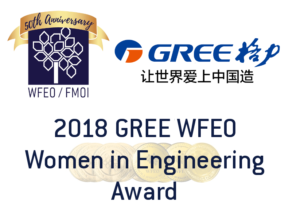 The GREE WFEO Women in Engineering Award, supported by GREE Electric Appliances Co., recognises the contributions of women to engineering at an international level. Outstanding women engineers from around the world nominated for this award.
The GREE WFEO Women in Engineering Award, supported by GREE Electric Appliances Co., recognises the contributions of women to engineering at an international level. Outstanding women engineers from around the world nominated for this award.The winner for the 2018 GREE WFEO Women in Engineering Award is Mrs. Maria-Teresa Estevan Bolea from Spain.
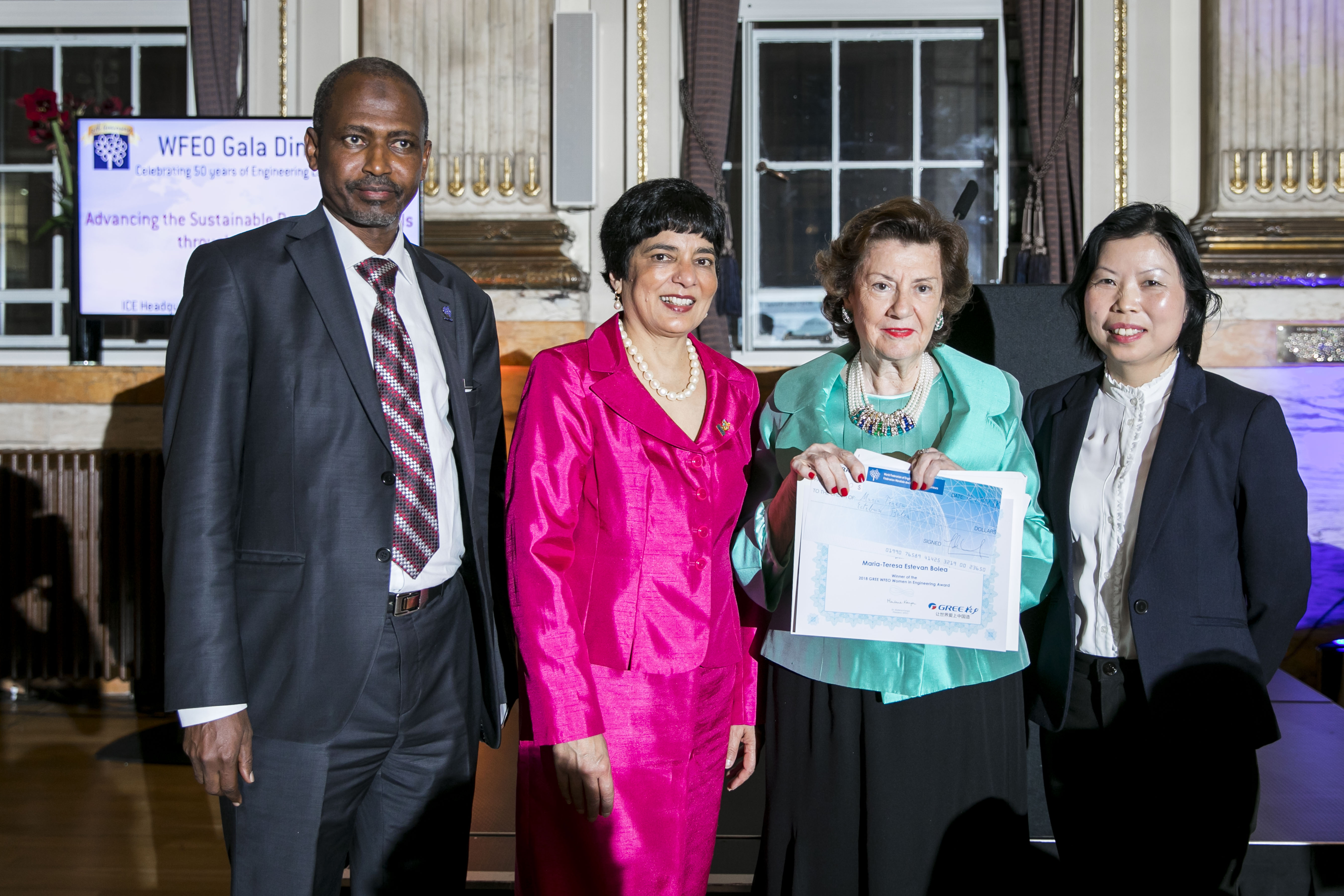 Mrs. Maria-Teresa Estevan Bolea from Spain, winner of the Inaugural GREE WFEO Women in Engineering Award
Mrs. Maria-Teresa Estevan Bolea from Spain, winner of the Inaugural GREE WFEO Women in Engineering AwardAbout the Awardee
Born on 26th October 1936, Maria- Teresa is the third woman in Spain to obtain an Industrial Engineer title in 1968 and was the first woman to join the Corps of Industrial Engineers of the Spanish Ministry of Industry and Energy.
Among the many positions of public responsibility that she has held are those of Member of the Spanish Congress of Deputies (1987-1993), Member of the European Parliament (1994-1999) stand out, also she was Chairperson of Energy, Environmental, Research and R&D Committee and Equal Opportunities for Women Committee, and also President of the Spanish Nuclear Safety Council (2001-2006).
Her commitment to the engineering professional organizations is accredited, not only with the close collaborations maintained from her positions, but with her positions as Vocal in the Association (2010-2014) and Dean of the Official College (2013-2016) of Industrial Engineers from Madrid. She is currently Director-General (CEO) of Sitesa Ingenieros S.A. What she has achieved with her perseverance is a vital example of how a woman can achieve what she considers important; even in the field of engineering.
Details of other accomplishments and qualifications includes:
- She was the first woman Engineer of State in Spain. Degree of High Specialisation in Welding and Environmental Engineering.
- She belongs to the Body of Industrial Engineers of the State.
- She has worked in companies of Engineering and Construction and Assembly of Cement Factories, Chemical Plants, Refineries, Thermal Power Stations, Oil and Gas Pipelines. She has also worked in Power Planning, in Power Technologies, Thermal Power Stations and Nuclear Energy.
- In July, 2001 she was appointed President of the Spanish Nuclear Safety Council (CSN).
- She has been Commissioner of the National Commission of Energy.
- President of the National Council of Industry and Energy (Ministry of Industry and Energy).
- Member of the European Parliament. Member and Spokesperson at the Commissions of Energy, Technological Research and Development and Environment.
- Member of the Spanish Congress of Deputies, Spokesperson for Energy and Environment matters.
- General Director for Environment and General Secretary of the Inter-ministerial Commission of Environment from the Ministry of Public Works (1979-1982) and General sub-Director at the Ministry of Public Works (1977-1978).
- She has worked in the General Directorate of Energy: Hydrocarbon and Gas Departments, Subdivision of Power Planning of the Ministry of Industry and Energy, and at the Subdivision of Industrial Pollution of the Ministry of Industry and Energy.
- Mrs. Estevan is member of several advisory groups within international organizations. She also participate as lecture at courses organized by Spanish and international organizations on Nuclear and radiation safety, Energy planning and policies and environmental engineering.
- She has a wide experience in international projects on energy, mechanical engineering and environmental installations.
- Currently, she is Director General of SITESA INGENIEROS S.A.
In addition to her intense dedication to the world of engineering and industry, it should be highlighted that she has received recognition in some other activities as follows:
- Gold Master of the Senior Management Forum.
- Her work in the social and professional promotion of women has been intense, facilitating numerous jobs for women.
- She intervened extensively in the energy works of the OECD (Paris) and CEPE (Geneva) and the Environment and in other international institutions.
- Author of the first publications on Environmental Impact Assessment.
- Was invited in 1993 for a month, by the United States Information Agency (program of international visitors of the USA governments)
- She has directed numerous energy projects (oil, gas and electricity and environmental protection in Latin American countries)
- Has the “Puig Adam” medal from the Technical High School of Industrial Engineering of the UPM.
- In 2007, the COIIM awarded her the Honorable Mention for her professional career.
- Professor “ad-honorem” of the UPM and other Spanish and foreign Universities.
- Prize of the Spanish Nuclear Society 1985 for the: “analysis of generation costs of the kWh”.
- Author of numerous publications, articles and conferences, etc.
- Member of various foundations and technical, social and welfare associations (Caritas, Red Cross, Unicef) and social studies.
The Young Engineers Competition
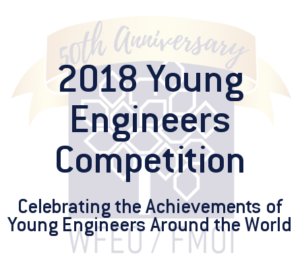 The Young Engineers Competition awarded the leadership efforts of young engineers around the world to progress the UN Sustainable Development Goals through engineering.
The Young Engineers Competition awarded the leadership efforts of young engineers around the world to progress the UN Sustainable Development Goals through engineering.The WFEO Executive Board and the Committee on Young Engineers/Future Leaders has been proud to host a competition for the best ideas and projects from young engineers around the world, who are progressing the UN Sustainable Development Goals through engineering. This was a key initiative of WFEO President Dr. Marlene Kanga to recognise the contributions of young engineers in leading sustainable development projects.
The best submissions have been published in the booklet “Young Engineers Advancing the UN SDGs”
Winner
Dr. Sim Siang Tze Victor (Singapore) Clean Water Access for Don Bosco School Hlaing Thar Yar, Myanmar Laureates
Eng. Emmanuel Adams (Ghana) Contribution of Greater Accra Metropolitan Area (GAMA) Water and Sanitation Project to the Progress of SDG Goal 6 Eng. Adonis Adornado (Philippines) Geographical and Varietal Origin Determination and Mapping of Philippine Fishery Products for Traceability and Biodiversity Assessment Dr. Melchizedek Alipio (Philippines) An IoT-based (Internet of Things) Water Quality Monitoring and Potability Prediction System for Rural Communities in the Philippines Eng. Luis Andrade (Venezuela) Solar energy for Venezuela’s public hospitals Eng. Netty Dalma Malca Perez (Peru) Aquaponic Systems to face Climate Change and to Ensure Global Food Security Eng. Rodrigo Israel González Velázquez (Mexico) Vínculo comunitario (Community Link through infrastructure projects) Eng. Avishek Malla (Nepal) Empowering Rural Agriculture with Solar Powered Irrigation Services Eng. Geoffrey Morgan (UK/USA) Infrastructure Capacity Assessment to Support Achieving the SDGs Eng. Irene Serrano González (Spain) An ecological sanitation project towards the well-being of the patients and the sustainability of the Kumi Hospital in Uganda Eng. Liu Shiqi (China) Targeted Poverty Alleviation Supported by Geo-Spatial Information Prof. Ning Zhang (China) Supplying Affordable and Clean Energy through Multiple Energy Systems Integration Prof. Ling Zhou (China) Water Supply Solution for Arid Area: Lost-cost, High Performance Solar Energy Electric Submersible Pump
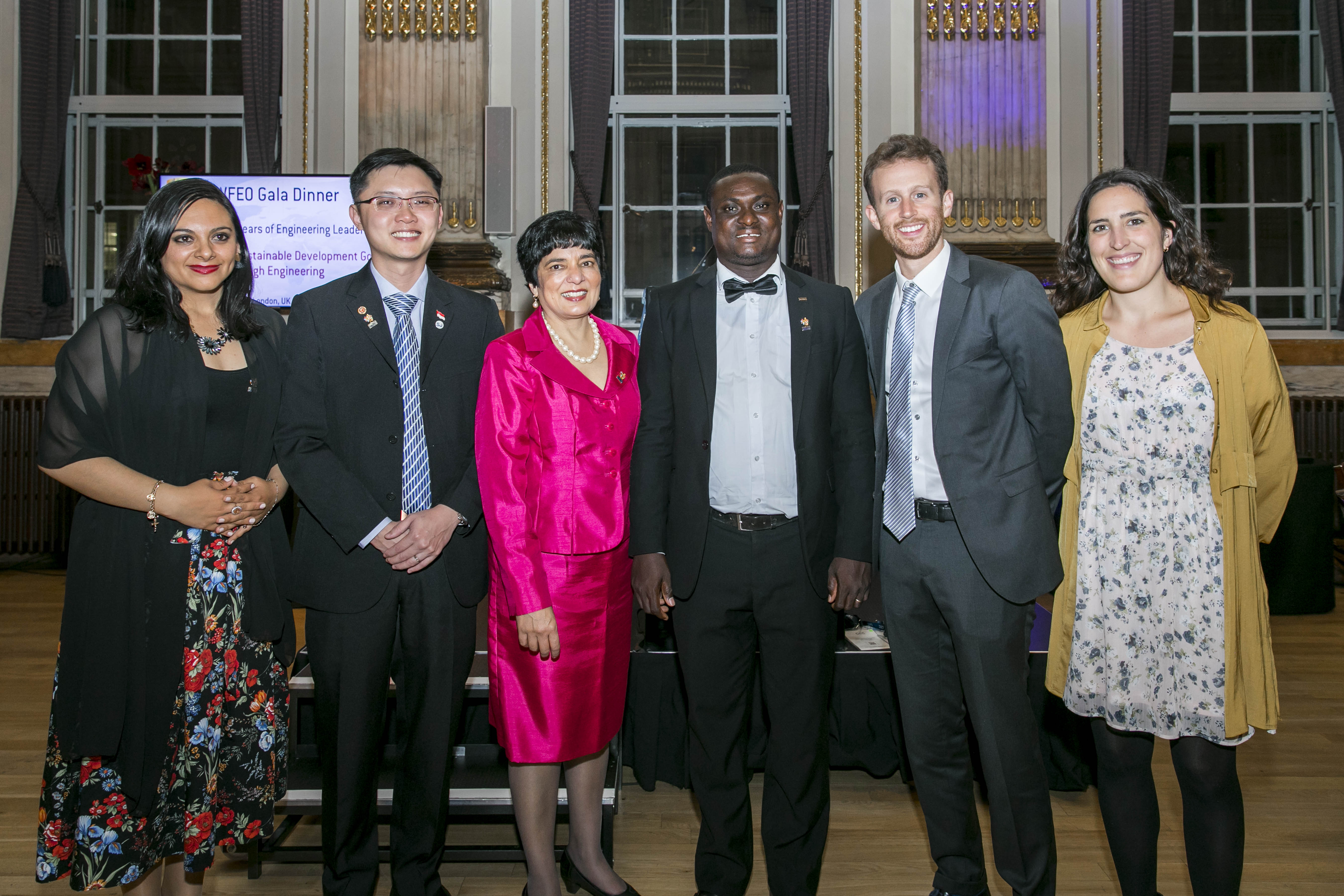 Young Engineer winners at the Gala Dinner
Young Engineer winners at the Gala Dinner
- 2017 Awards
- The WFEO 2017 Awards were presented in Rome, Italy at the WFEO Gala dinner on 1 December 2017 during the General Assembly meetings.
WFEO Medal of Engineering Excellence
Ifedayo Akintunde is the winner of the 2017 WFEO Award of Engineering Excellence.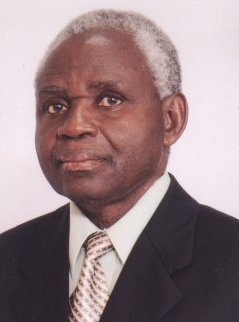 Engr. Ifedayo Akintunde is a Fellow of Nigerian Society of Engineers, the British Institute of Civil Engineers, the Nigerian Academy of Engineering and Member of the American Society of Engineers. He is quoted in at least four World “Who’s Whos”.
Engr. Ifedayo Akintunde is a Fellow of Nigerian Society of Engineers, the British Institute of Civil Engineers, the Nigerian Academy of Engineering and Member of the American Society of Engineers. He is quoted in at least four World “Who’s Whos”.He practiced in the UK and later spent 13 years in the Ministry of Works and Transport Western Region of Nigeria until 1974. He was Chief Engineer in Chief L.A.O. Banjoko & Co., then a leading indigenous Civil Engineering Construction Company 1974 – 1976. He later founded Profen Consultants in 1976 of which he is Chief Executive Officer till today. He was President of the Nigerian Society of Engineers 1978 – 1988.
He is also a former Vice President of WFEO (1991–2003) to which he made outstanding and fundamental contributions, including but not limited to the revision of the WFEO constitution, drafting of the WFEO Code of Environmental Engineering Practice, the Assistant Editor of the WFEO Magazine and the Chairman of the Election Committee for many years. He was a winner of the Ibadan Diocesan Anglican 2007 Merit Award.
WFEO Medal of Excellence in Engineering Education
Dr. B.V.A. Rao is the winner of the 2017 WFEO Award of Excellence in Engineering Education.
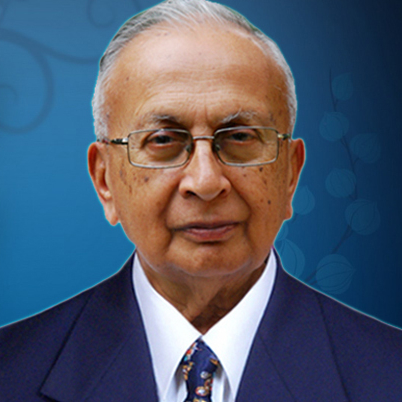 Dr. B.V.A. Rao, a Mechanical Engineer and a Fellow of Institution of Engineers (India) (IEI) since 70s and former Chairman of National Design Research Forum of IEI had an outstanding academic career serving over 55 years in different capacities at Higher Institutes of Technology and Deemed Universities in India and a visiting Faculty in Germany and Singapore.
Dr. B.V.A. Rao, a Mechanical Engineer and a Fellow of Institution of Engineers (India) (IEI) since 70s and former Chairman of National Design Research Forum of IEI had an outstanding academic career serving over 55 years in different capacities at Higher Institutes of Technology and Deemed Universities in India and a visiting Faculty in Germany and Singapore.Besides his contribution to many major industries, both in public and private sectors of this country such as Defence, Space, Atomic Energy, Oil and Natural Gas Commission, Process Industries etc. are noteworthy and many of them have brought distinguished awards to him. In this context, his concern and contribution for the growth of many Engineering Professional Societies in the country is highly commendable and unique.
Dr. Rao has also distinguished himself with large number of publications, both in national and International journals, guiding nearly 22 Ph.D. candidates and other large number of Master’s Thesis resulting in over 200 papers, quite a few of them well cited.
He was even honoured by many the Technical University of Dresden in Germany by awarding him a Golden Doctorate, a distinction given to their Ph.D. candidates (Dr. Ing.) after 50 years of their completion. He has received the Fellowship of the Indian National Academy of Engineering (FNAE) in 1988 and the National Design Award by the Institution of Engineers (India) in 2004.
The Hassib J. Sabbagh Award for Engineering Construction Excellence – 2017 Award for Building Infrastructures in Africa
The Nacala Corridor Project is the winner of the 2017 Hassib J. Sabbagh Award for Engineering Construction Excellence.

The Nacala Corridor Project was the biggest railway contract in the last 50 years in Africa with enormous impact in the Eastern Africa Region. With VALE, the 2nd Biggest Mining in the world as client, Mota-Engil has worked with the most demanding quality standards, being recognized by the customer for the level of quality and safety. The completion of the project on time, the excellence of the service gave the opportunity to the customer to deliver the maintenance contract and further new contracts such as in Brazil and Mozambique.The Nacala Corridor Project was represented by:
- António Manuel Queirós Vasconcelos da Mota, Chairman at Mota-Engil SGPS SA
- Ismael Gaspar, Chairman of Mota-Engil Africa during the development of the project
- João Neto, General Manager of the Nacala Contract
António Manuel Queirós Vasconcelos da Mota is one of the most relevant Portuguese entrepreneurs in the dynamism of the internationalization of the Portuguese economy, namely in several African countries.
He has also been a promoter of the technical and innovation development of his company, with a training center in these countries, promoting the scientific and technical knowledge of Engineering in all Africa as well.
- 2015 Awards
- The WFEO 2015 Awards were presented in Kyoto, Japan at the WFEO Gala dinner on 3 December 2015 during the General Assembly meetings.
WFEO Medal of Engineering Excellence
Prof. Lu Youmei is the winner of the 2015 WFEO Award of Engineering Excellence.
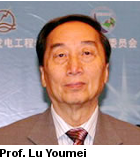 Professor Lu Youmei is renowned Chinese hydropower engineering expert and has devoted his whole career into China’s water dams and hydropower development.
Professor Lu Youmei is renowned Chinese hydropower engineering expert and has devoted his whole career into China’s water dams and hydropower development.He has taken part and led the construction of many mega-size hydropower projects with a total installed capacity of 25,940 MW, which include the world’s largest water conservancy and hydropower Three Gorges Project.
Mr. Lu has been Vice Minister of the Ministry of Energy of China, President of China Three Gorges Project Company (CTGPC), Chairman of Chinese National Committee on Large Dams (CHINCOLD). He has rich experience in energy development and project management, having huge influence in and out of the industry.
WFEO Medal of Excellence in Engineering Education
Prof. Chan Wirasinghe is the winner of the 2015 WFEO Award of Excellence in Engineering Education.
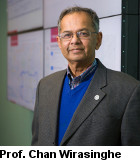 Chan Wirasinghe is an engineering educator who obtained his B.Sc. in Civil Engineering from the University of Ceylon in 1968.
Chan Wirasinghe is an engineering educator who obtained his B.Sc. in Civil Engineering from the University of Ceylon in 1968.He won a US Fulbright Scholarship to Berkeley and completed his Ph.D. in 1976. He moved to the University of Calgary in Canada in 1976 where he is currently a Professor of Civil Engineering. He is also the Academic Director of the Center for Transportation of the Van Horne Institute.
Dr. Wirasinghe became the Dean of the Schulich School of Engineering in 1994, held the post until July 2006, and advanced the School to be one of the best in Canada. In addition to traditional disciplines, the School offers B.Sc. programs in Software, Biomedical, Oil and Gas, Geomatics and Energy Engineering. It is a leader in women in engineering activities.
Dr. Wirasinghe’s research interests are in transportation and mitigation of natural disasters. He has issued over 250 publications and supervised over forty research students.
Professor Chan Wirasinghe is a Fellow of Engineers Canada, the Canadian Academy of Engineering, and has received the Alberta Premiers Award of Excellence, a D.Sc. (Honorary) from the University of Moratuwa, the APEGA Centennial Award, and was named Calgary’s Citizen of the Year for 2005.
The Hassib J. Sabbagh Award for Engineering Construction Excellence
The Jinping Project Team is the winner of the 2015 Hassib J. Sabbagh Award for Engineering Construction Excellence.
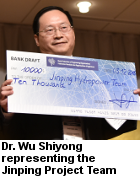 Dr. WU Shiyong, Vice General Manager/Professoriate Senior Engineer Yalong River Hydropower Development Company, LTD is representing the Jinping Project Team.
Dr. WU Shiyong, Vice General Manager/Professoriate Senior Engineer Yalong River Hydropower Development Company, LTD is representing the Jinping Project Team.After endeavors for over a decade, the Jinping Project Team led by Dr. Chen Yunhua overcame numerous world-level difficulties in construction of the super-tall arch dam and deep-buried tunnels and caverns, and successfully built the two world-class huge hydropower projects.
Dr. Wu Shiyong, Vice General Manager of Yalong River Hydropower Development Company, Ltd. represented the Jinping Project Team and received the award.
- 2013 Awards
- The WFEO 2013 Awards were presented in Singapore at the WFEO Gala dinner on 13 September 2013 during the General Assembly meetings.
WFEO Medal of Engineering Excellence
The first presentation of the WFEO Medal of Engineering Excellence was made in September 1989 in Prague, Czechoslovakia, during the 12th General Assembly of WFEO.
The Medal is presented biennially hereafter, helping direct world attention to the practice, theory and public contributions of engineering. The recipient is chosen based on his or her noteworthy contributions to the practice, theory, or public status of engineering. Selection also takes into consideration the appreciable experience in the profession, international standing as well as significant educational accomplishments.
Prof. Chan is the winner of the 2013 WFEO Award of Engineering Excellence for his contributions to the advancement of theory, practice, commercialization of electric vehicles and creative engineering education.
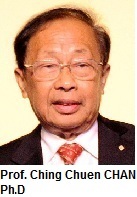 Prof CHAN is one of the foremost international authorities on electric vehicles.
Prof CHAN is one of the foremost international authorities on electric vehicles.He has made an outstanding contribution to science, technology and industry.
He served as chairman of more than a dozen committees of international professional institutions
His contribution is wide ranging in the international arena and covers academic industrial, professional, educational and public awareness issues.WFEO Medal of Excellence in Engineering Education
The first presentation of WFEO Medal for Excellence in Engineering Education was made in Madrid, Spain, in November 1999, during the 18th General Assembly of WFEO. The Medal was to be presented biennially hereafter, helping direct world attention to the importance of continuing improvement in the quality, delivery and relevance of engineering education and training.
The recipient is chosen based on his or her noteworthy contributions to the improvement of engineering education. Special consideration is also given to outstanding services rendered by educators to engineering educational institutions, and to those involved in the education of engineers. Selection also takes into account appreciable experience in the profession as well as significant educational accomplishments.
Prof. Xila Liu is the winner of the 2013 WFEO Award of Excellence in Engineering Education.
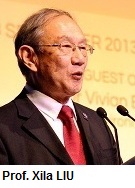 He served in WFEO for more than 14 years and is currently finishing his term as National Member for China at the WFEO Executive Council.
He served in WFEO for more than 14 years and is currently finishing his term as National Member for China at the WFEO Executive Council.He is also member of the WFEO committees on Engineering Capacity Building and Education in Engineeringand is a Registered Structural Engineer (First Class) in China and a Chartered Engineer in UK.
His competency in drafting and creating engineering education strategies and programs on national and international scales is highly recognized.
He received many education awards such as the “Beijing Excellence Teacher Award” and “Shanghai Teaching Masters Award”.
He was twice voted as “The Favorite Teacher” by 17000 SJTU students. Since 1987, he advised 37 PhD and 52 Master students.
He is the author or co-author of 5 books and about 400 technical papers.
The Hassib J. Sabbagh Award for Engineering Construction Excellence
The purpose of this Award is to direct world attention to the role of engineering in sustainable development. The Consolidated Contractors Company (CCC), under the leadership of late Hassib J. Sabbagh, gave the World Federation of Engineering Organizations (WFEO) responsibility for organizing the Hassib J. Sabbagh Award for Engineering Construction Excellence.
This Award was instituted in 2002 by the initiative and endowment of late Hassib J. Sabbagh who devoted many years of concern and effort in the area of engineering and construction.
The London 2012 Olympic Park Project Team is the winner of the 2013 Hassib J. Sabbagh Award for Engineering Construction Excellence.
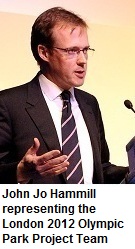 The London 2012 Olympic Park Project Team were a triumph not just for sport, but a triumph for engineering. Demonstrating the transformational power of civil engineering to act as an agent of change and provide the underpinning infrastructure on which civilizations depends, lifting both body and spirit to new heights.
The London 2012 Olympic Park Project Team were a triumph not just for sport, but a triumph for engineering. Demonstrating the transformational power of civil engineering to act as an agent of change and provide the underpinning infrastructure on which civilizations depends, lifting both body and spirit to new heights.Record breaking on and off the track, the Olympic Delivery Authority (ODA) and LOCOG and their delivery partners conceived, designed, constructed and delivered the most sustainable Olympic and Paralympic facilities ever built, on time and budget to high sustainability standards. The London Olympic Park has delivered sustainability at the systems scale. The Olympic Park is the largest new urban parkland in Europe for 150 years, a 2.5 square-km site featuring a number of waterways and links to surrounding areas via highway, cycle way and rail networks. In the preparation of the site, segregation of waste on site was over 90% against an industry average of 50%.
One million m3 of the excavated materials on the site needed environmental treatment/remediation. Around 69% of all materials were to develop the Park brought in by rail or river, minimizing traffic disruption and with other environmental benefits. The Accident Frequency Rate (AFR) was 0.17 compared to the UK construction sector average of 0.4
All of the civil engineering, landscaping and public realm works at the Olympic Park were assessed and verified using CEEQUAL in 17 separate package assessments, all achieving ‘Excellent’ rate awards.
London 2012 was the first Summer Olympic and Paralympic Games to measure its carbon footprint over the entire project term.
The Olympic Park project has not only set a high standard for future large-scale sporting events and infrastructure projects, but has also shown the transformative power of civil engineering to deliver sustainable outcomes at the systems level, while simultaneously transforming the industry itself.
- 2011 Awards
- The WFEO 2011 Awards were presented in Geneva, Switzerland at the WFEO Gala dinner on 8 September 2011 during the General Assembly meetings.
WFEO Medal of Engineering Excellence
Dr. Bill Salmon from the USA, is the winner of the 2011 WFEO Award of Engineering Excellence.
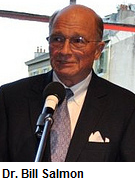 Mr. Bill Salmon has extensive experience in engineering and science policy through his career with the U.S. National Academy of Engineering and the Department of State. His professional activities included: having negotiated and managed bilateral science cooperation agreements between the US and over 20 other countries; created the Office of Environmental Affairs; US negotiator on several international treaties, including the International Ocean Dumping Convention, US-France-UK Stratosphere Research Agreement, Law of the Sea Convention; extensive involvement on behalf of the US in the science and engineering programs of UNESCO, IAEA, OECD; contributed significantly to the organization of the 1972 UN Conference on the Environment (Stockholm Conference) and the initial formation of UNEP; created Office of International Communications Policy, and opened communications satellites to US private sector.
Mr. Bill Salmon has extensive experience in engineering and science policy through his career with the U.S. National Academy of Engineering and the Department of State. His professional activities included: having negotiated and managed bilateral science cooperation agreements between the US and over 20 other countries; created the Office of Environmental Affairs; US negotiator on several international treaties, including the International Ocean Dumping Convention, US-France-UK Stratosphere Research Agreement, Law of the Sea Convention; extensive involvement on behalf of the US in the science and engineering programs of UNESCO, IAEA, OECD; contributed significantly to the organization of the 1972 UN Conference on the Environment (Stockholm Conference) and the initial formation of UNEP; created Office of International Communications Policy, and opened communications satellites to US private sector.He has been active supporter of the American Association of Engineering Societies (AAES) since 1986 and has been an active proponent of global engineering associations, including CAETS – the Councils Academies of Engineering and Technology, UPADI the Pan American Association of Engineering Societies and WFEO – the World Federation of Engineering Organizations.
WFEO Medal of Excellence in Engineering Education
Prof. Wlodzimierz Miszalski from Poland is the winner of the 2011 WFEO Award of Excellence in Engineering Education.
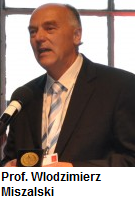 Since 2005 to 2010 President of the WFEO Committee on Education and Training. Prof. Wlodzimierz MISZALSKI has been thesis supervisor of numerous generations of diploma works of numerous generations of engineers and supervisor of doctors’ dissertations. He has been organizer and executor of first postgraduate courses for engineers in logistics and management in Poland.
Since 2005 to 2010 President of the WFEO Committee on Education and Training. Prof. Wlodzimierz MISZALSKI has been thesis supervisor of numerous generations of diploma works of numerous generations of engineers and supervisor of doctors’ dissertations. He has been organizer and executor of first postgraduate courses for engineers in logistics and management in Poland.He is author of postgraduate engineering education programs and curricula. During his term as President of WFEO Committee on Education and Training he organized international conferences and congresses on engineering education and was editor of international journal IDEAS devoted to engineering education. He has created and developed the idea of World University of Technology.
The Hassib J. Sabbagh Award for Engineering Construction Excellence
Dr. Riad Zakhem from the USA is the winner of the 2011 Hassib J. Sabbagh Award for Engineering Construction Excellence.
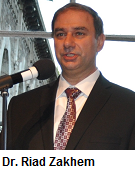 Dr. Zakhem was involved in many Solar Photovoltaic projects from the design phase to the actual construction supervision and finally Commissioning of the system. His innovations included smart easy to build rooftop PV system that blend with the existing structure using the most economical and most efficient building techniques to make the solar system economically viable and resilient.
Dr. Zakhem was involved in many Solar Photovoltaic projects from the design phase to the actual construction supervision and finally Commissioning of the system. His innovations included smart easy to build rooftop PV system that blend with the existing structure using the most economical and most efficient building techniques to make the solar system economically viable and resilient.In the project, based on Which I am nominating Dr. Zakhem, he installed a 99.3 KW PV system on a warehouse in Littleton Colorado. The PV Solar panels were installed on the EPDM roof without any anchoring. He devised a racking system that uses ballasts to overcome the wind load on the PV panels.
He also used the existing ballasting material on the roof (2″ gravel) as ballast for his racking system resulting in an attractive system that blends in with the surrounding. He was also very creative in combining 12 single phase inverters into a balanced three phase grid tied output which made the system very resilient and easy to maintain with minimal cost without compromising quality and safety.
- 2009 Awards
-
WFEO Medal of Engineering Excellence
Mr. Seshadri Srinivasan from India, is the winner of the 2009 WFEO Award of Engineering Excellence.
WFEO Medal of Excellence in Engineering Education
Mrs. Yi Qian from China is the winner of the 2009 WFEO Award of Excellence in Engineering Education.
The Hassib J. Sabbagh Award for Engineering Construction Excellence
Mr. Qifan BAO from China is the winner of the 2009 Hassib J. Sabbagh Award for Engineering Construction Excellence.
- 2007 Awards
-
WFEO Medal of Engineering Excellence
Prof. Guram Kashakashvili from Georgia, is the winner of the 2007 WFEO Award of Engineering Excellence.
WFEO Medal of Excellence in Engineering Education
Prof. Kang Chang Hsin from Hong Kong, SAR of China is the winner of the 2007 WFEO Award of Excellence in Engineering Education.
The Hassib J. Sabbagh Award for Engineering Construction Excellence
The team M/S Larsen & Toubro ltd from India is the winner of the 2007 Hassib J. Sabbagh Award for Engineering Construction Excellence.
- 2005 Awards
-
WFEO Medal of Engineering Excellence
Dr. C.C. Patel from India, is the winner of the 2005 WFEO Award of Engineering Excellence.
WFEO Medal of Excellence in Engineering Education
Dr. Arcot Ramachandran from India is the winner of the 2005 WFEO Award of Excellence in Engineering Education.
The Hassib J. Sabbagh Award for Engineering Construction Excellence
Dr. Bernard J. Amadei from the USA is the winner of the 2005 Hassib J. Sabbagh Award for Engineering Construction Excellence.

